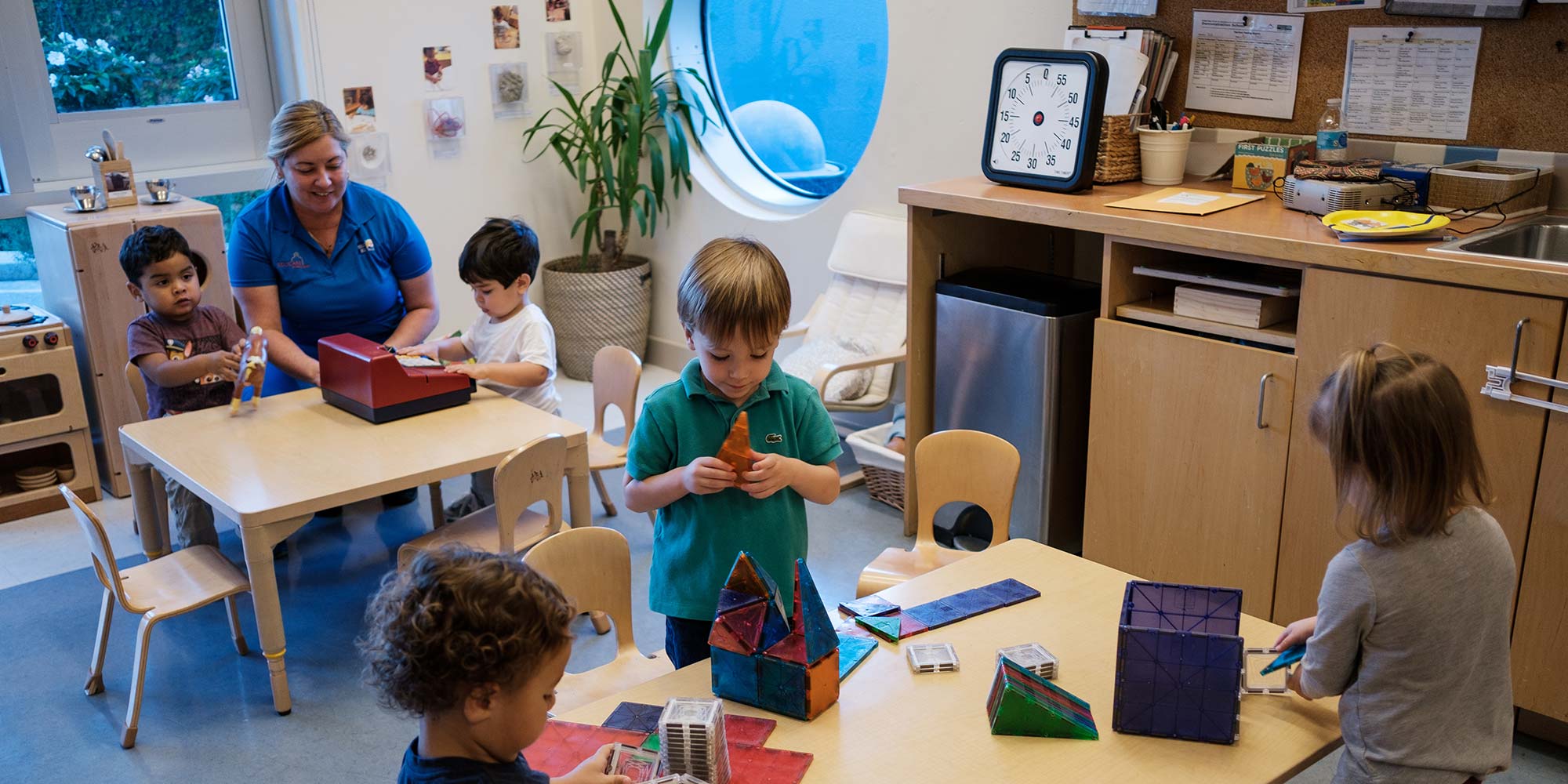If you'd like to use these Teachable Moments yourself, you can find download them all here.
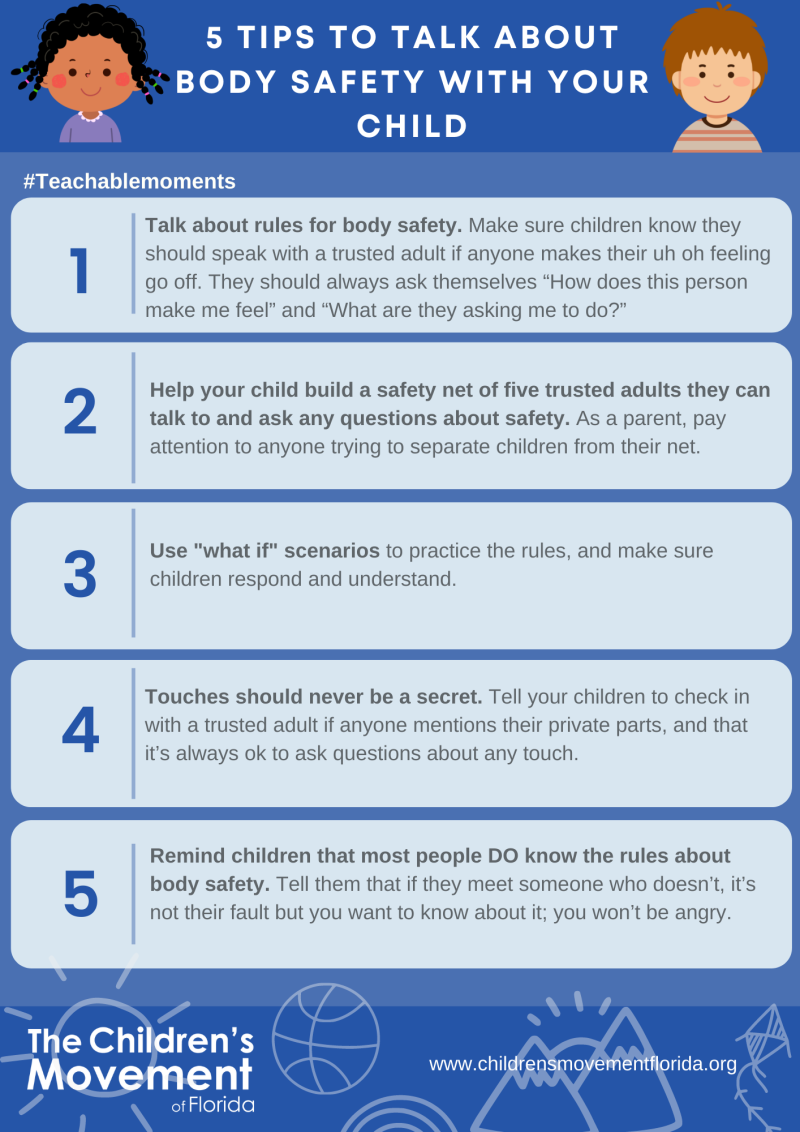
5 Tips to Talk About Body Safety With Your Child
1. Talk about rules for body safety. Make sure children know they should speak with a trusted adult if anyone makes their uh oh feeling go off. They should always ask themselves “How does this person make me feel” and “What are they asking me to do?”
2. Help your child build a safety net of five trusted adults they can talk to and ask any questions about safety. As a parent, pay attention to anyone trying to separate children from their net.
3. Use "what if" scenarios to practice the rules, and make sure children respond and understand.
4. Touches should never be a secret. Tell your children to check in with a trusted adult if anyone mentions their private parts, and that it’s always ok to ask questions about any touch.
5. Remind children that most people DO know the rules about body safety. Tell them that if they meet someone who doesn’t, it’s not their fault but you want to know about it; you won’t be angry.
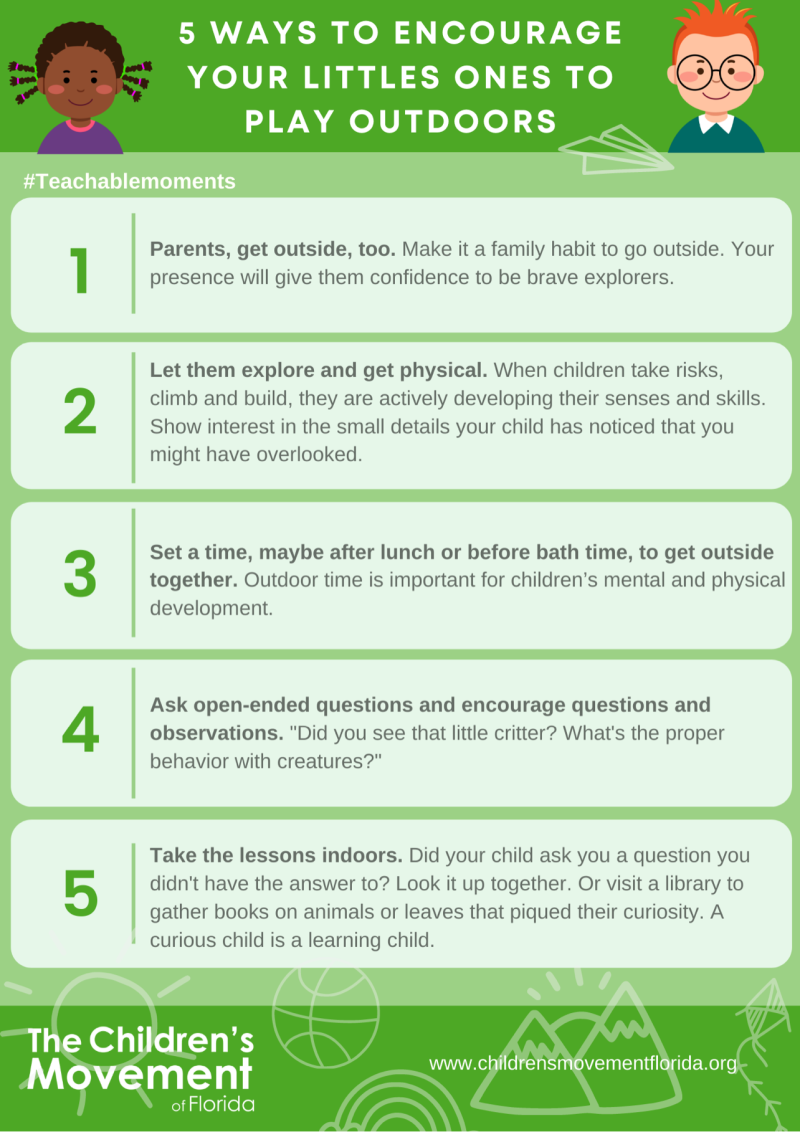
5 Ways To Encourage Your Little Ones to Play Outdoors
- Parents, get outside, too. Make it a family habit to go outside. Your presence will give them confidence to be brave explorers.
- Let them explore and get physical. When children take risks, climb and build, they are actively developing their senses and skills. Show interest in the small details your child has noticed that you might have overlooked.
- Set a time, maybe after lunch or before bath time, to get outside together. Outdoor time is important for children's Mental and physical development.
- Ask open-ended questions and encourage questions and observations. "Did you see that little critter? What's the proper behavior with creatures?"
- Take the lessons indoors. Did your child ask you a question you didn't have the answer to? Look it up together. Or visit a library to gather books on animals or leaves that piqued their curiosity. A curious child is a learning child.
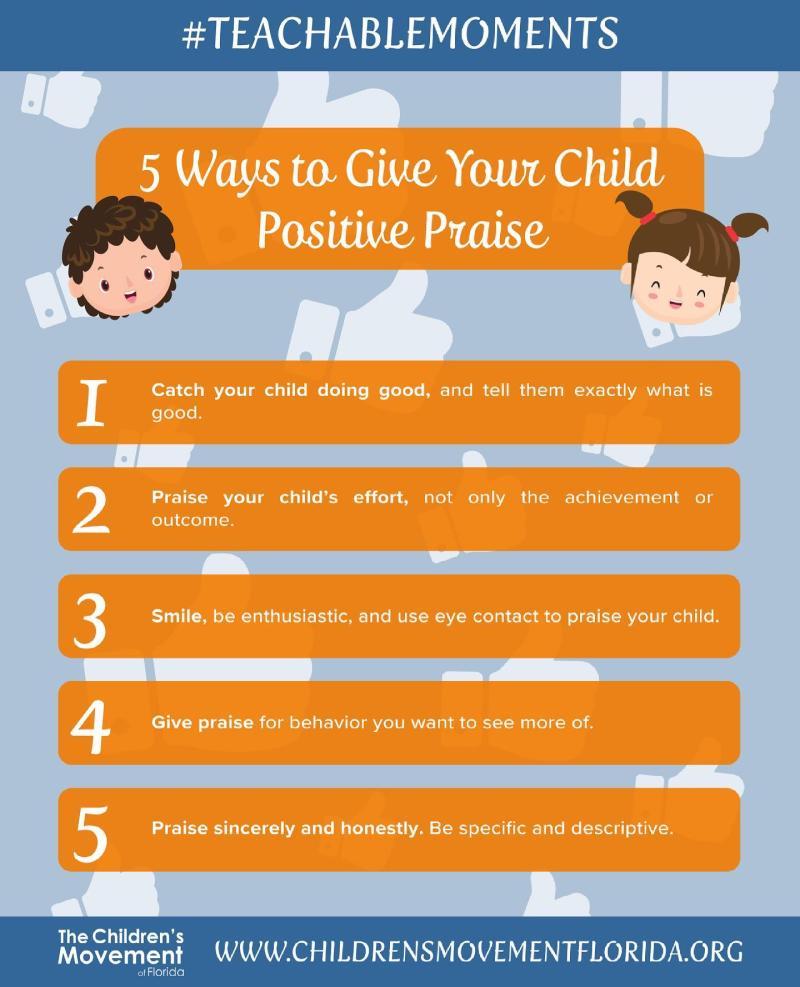
5 Ways to Give Your Child Positive Praise
- Catch your child doing good, and tell them exactly what is good.
- Praise your child's effort, not only the achievement or outcome.
- Smile, be enthusiastic, and use eye contact to praise your child.
- Give praise for behavior you want to see more of.
- Praise sincerely and honestly. Be specific and descriptive.
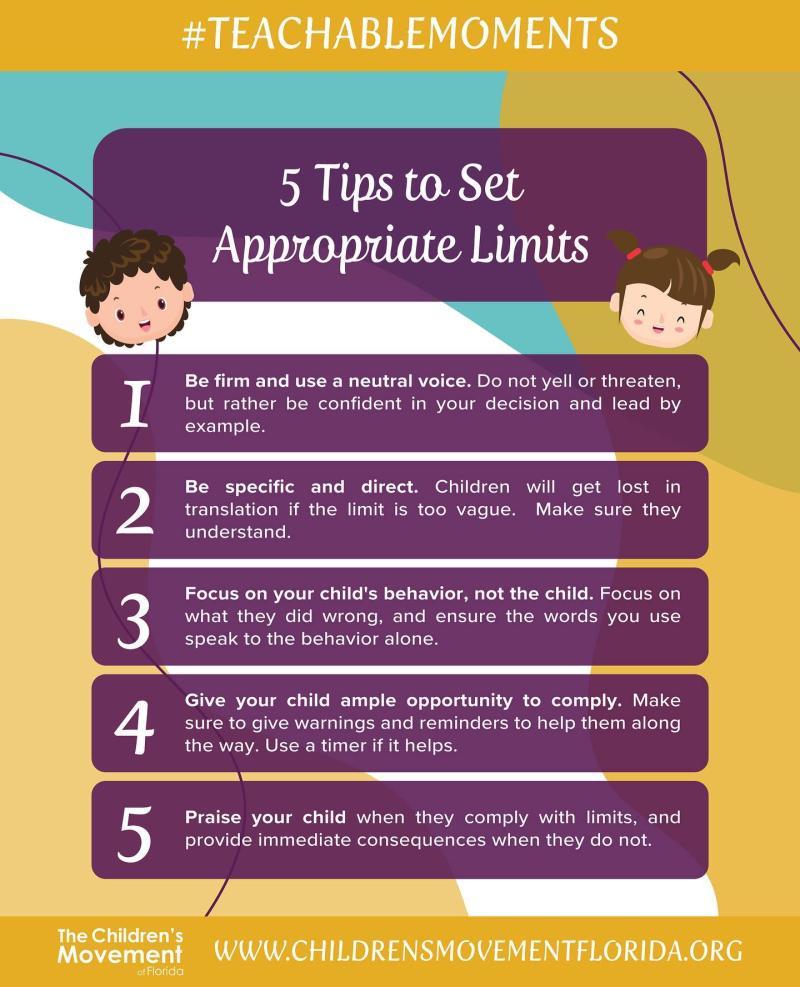
5 Tips to Set Appropriate Limits
- Be firm and use a neutral voice. Do not yell or threaten, but rather be confident in your decision and lead by example.
- Be specific and direct. Children will get lost in translation if the limit is too vague. Make sure they understand.
- Focus on your child's behavior, not the child. Focus on what they did wrong, and ensure the words you use speak to the behavior alone.
- Give your child ample opportunity to comply. Make sure to give warnings and reminders to help them along the way. Use a time if it helps.
- Praise your child when they comply with limits, and provide immediate consequences when they do not.
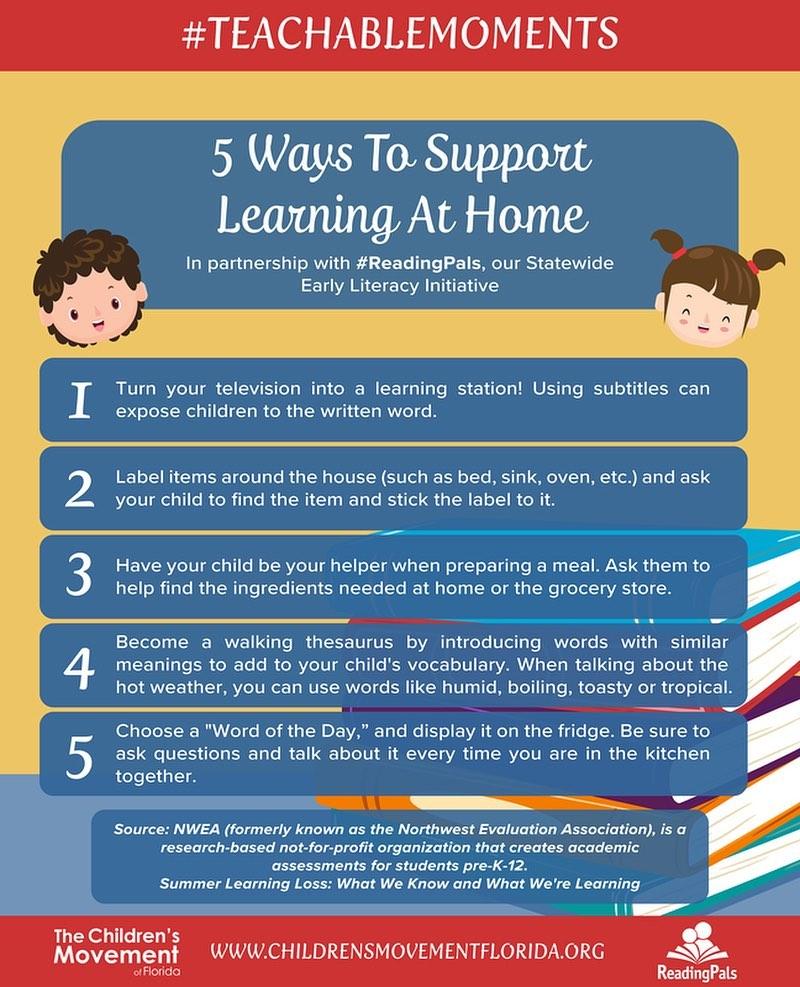
5 Ways to Support Learning At Home
In partnership with ReadingPals, our statewide early literacy initiative.
- Turn your television into a learning station! Using subtitled can expose children to the written word.
- Label items around the house (such as bed, sink, oven, etc.) and ask your child to find the item and stick the label to it.
- Have your child be your helper when preparing a meal. Ask them to help find the ingredients needed at home or the grocery store.
- Become a walking thesaurus by introducing words with similar meanings to add to your child's vocabulary. When talking about the hot weather, you can use words like humid, boiling, toasty or tropical.
- Choose a "Word of the Day" and display it on the fridge. Be sure to ask questions and talk about it every time you are in the kitchen together.
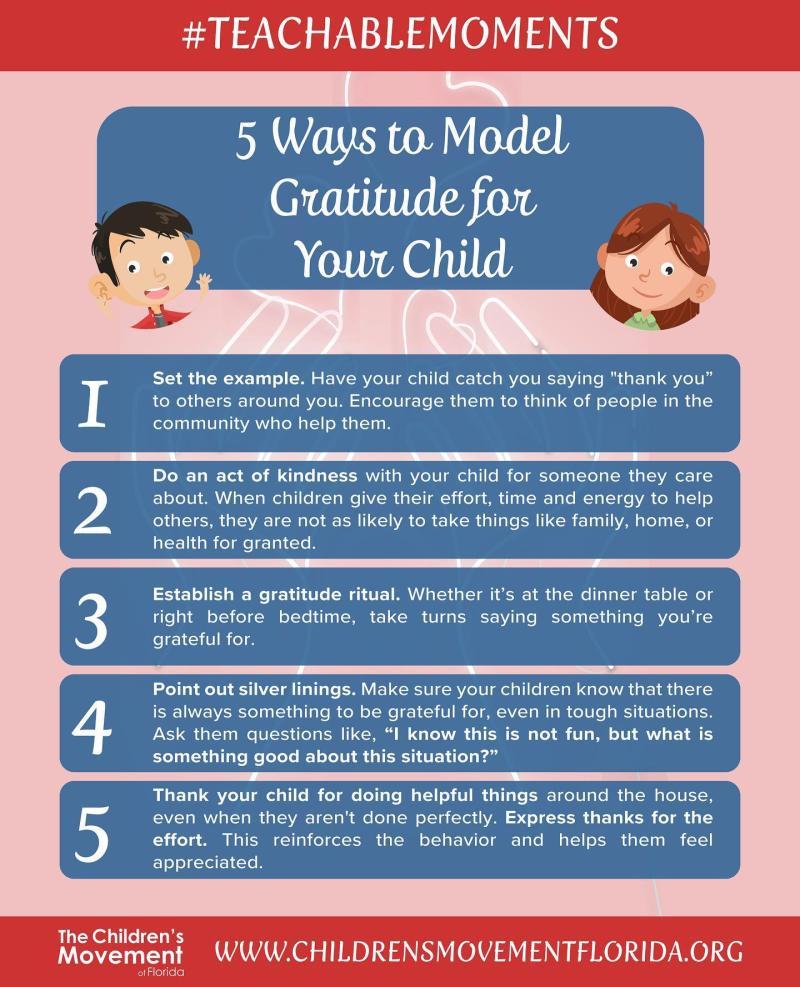
5 Ways to Model Gratitude for Your Child
- Set the example. Have your child catch you saying "thank you" to others around you. Encourage them to think of people in the community who help them.
- Do an act of kindness with your child for someone they care about. When children give their effort, time and energy to help others, they are not as likely to take things like family, home, or health for granted.
- Establish a gratitude ritual. Whether it's at the dinner table or right before bedtime, take turns saying something you're grateful for.
- Point out silver linings. Make sure your children' know that there is always something to be grateful for, even in tough situations. Ask them questions like, "I know this is not fun, but what is something good about this situation?"
- Thank your child for doing helpful things around the house, even when they aren't done perfectly. Express thanks for the effort. This reinforces the behavior and helps them feel appreciated.
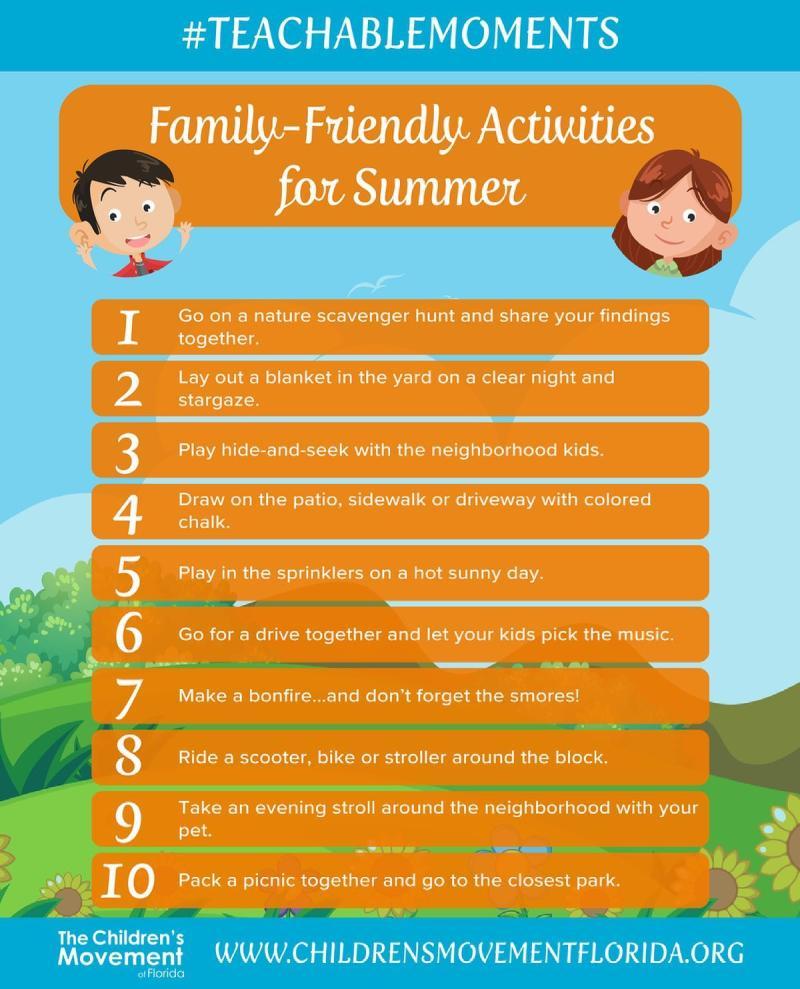
Family-Friendly Activities for Summer
- Go on a nature scavenger hunt and share your findings together.
- Lay out a blanket in the yard on a clear night and stargaze.
- Play hide-and-seek with the neighborhood kids.
- Draw on the patio, sidewalk or driveway with colored chalk.
- Play in the sprinklers on a hot sunny day.
- Go for a drive together and let your kids pick the music.
- Make a bonfire...and don't forget the smores!
- Ride a scooter, bike or stroller around the block.
- Take an evening stroll around the neighborhood with your pet.
- Pack a picnic together and go to the closest park.
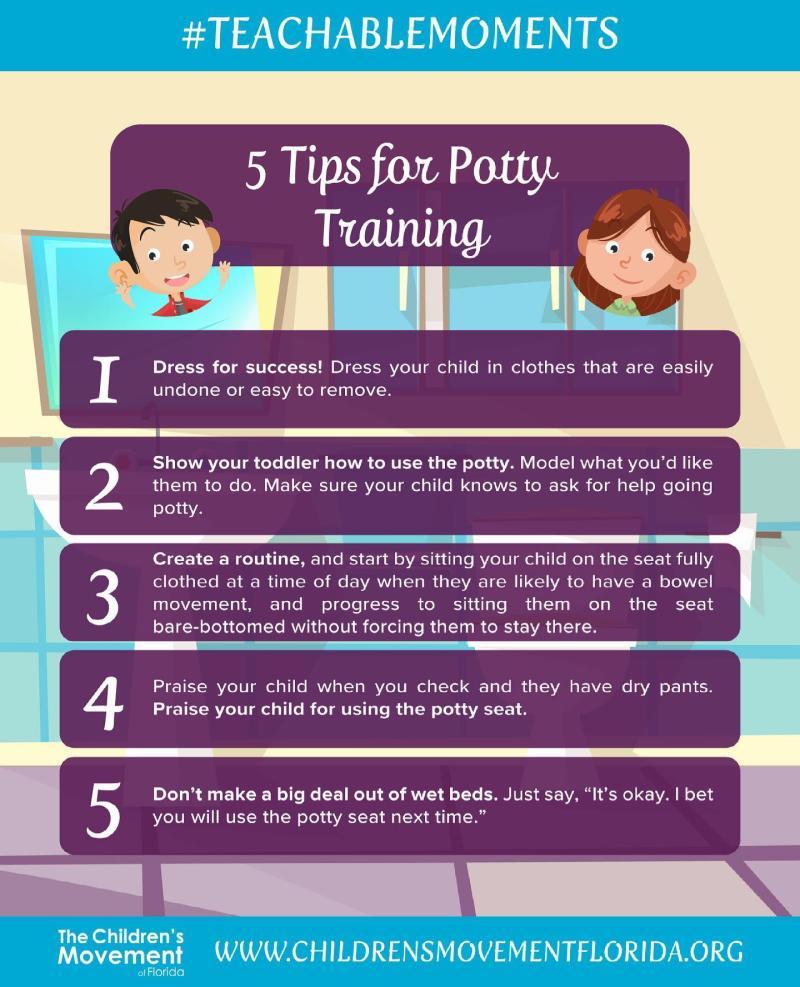
5 Tips for Potty Training
- Dress for success! Dress your child in clothes that are easily undone or easy to remove.
- Show your toddler how to use the potty. Model what you'd like them to do. Make sure your child knows to ask for help going potty.
- Create a routine, and start by sitting your child on the seat fully clothes at a time of day when they are likely to have a bowel movement, and progress to sitting them on the seat bare-bottomed without forcing them to stay here.
- Praise your child when you check and they have dry pants. Praise your child for using the potty seat.
- Don't make a big deal out of wet beds. Just say, "It's okay. I bet you will use the potty seat next time."
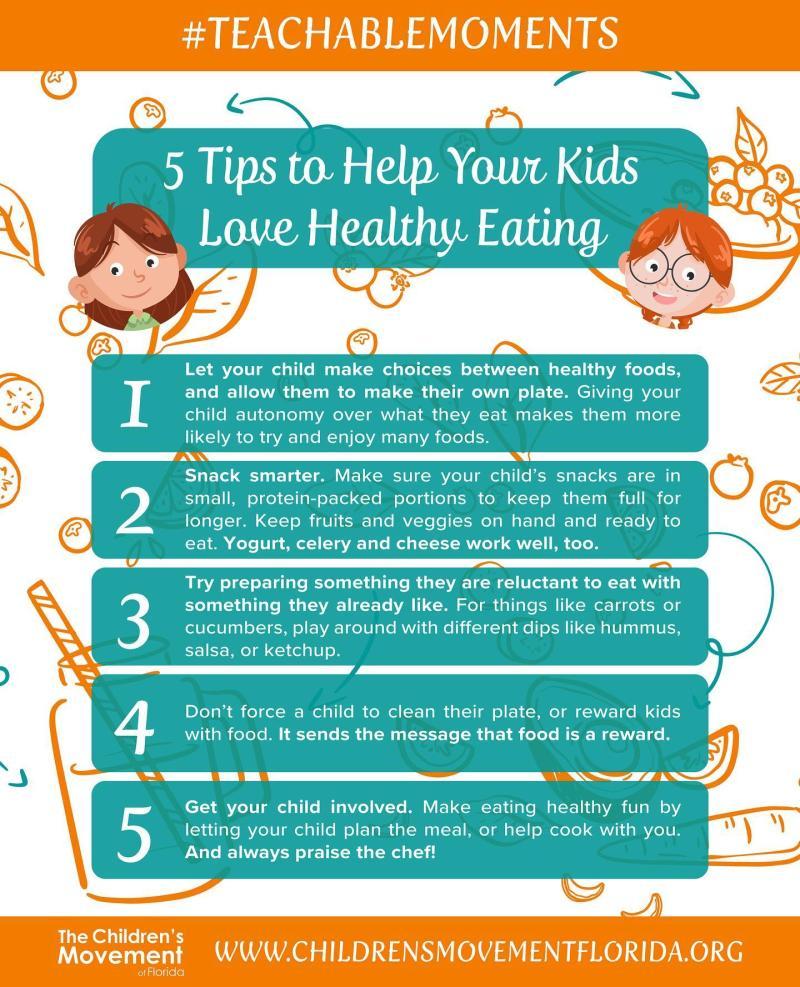
5 Tips to Help Your Child Love Healthy Eating
- Let your child makes choices between healthy foods, and allow them to make their own plate. Giving your child autonomy over what they eat makes them more likely to try and enjoy many foods.
- Snack smarter. Make sure your child's snacks are in small, protein-packed portions to keep them full for longer. Keep fruits and veggies on hand and ready to eat. Yogurt, celery and cheese work well, too.
- Try preparing something they are reluctant to eat with something they already like. For things like carrots or cucumbers, play around with different dips like hummus, salsa, or ketchup.
- Don't force a child to clean their plate, or reward kids with food. It sends the message that food is a reward.
- Get your child involved. Make eating healthy fun by letting your child plan the meal, or help cook with you. And always praise the chef!
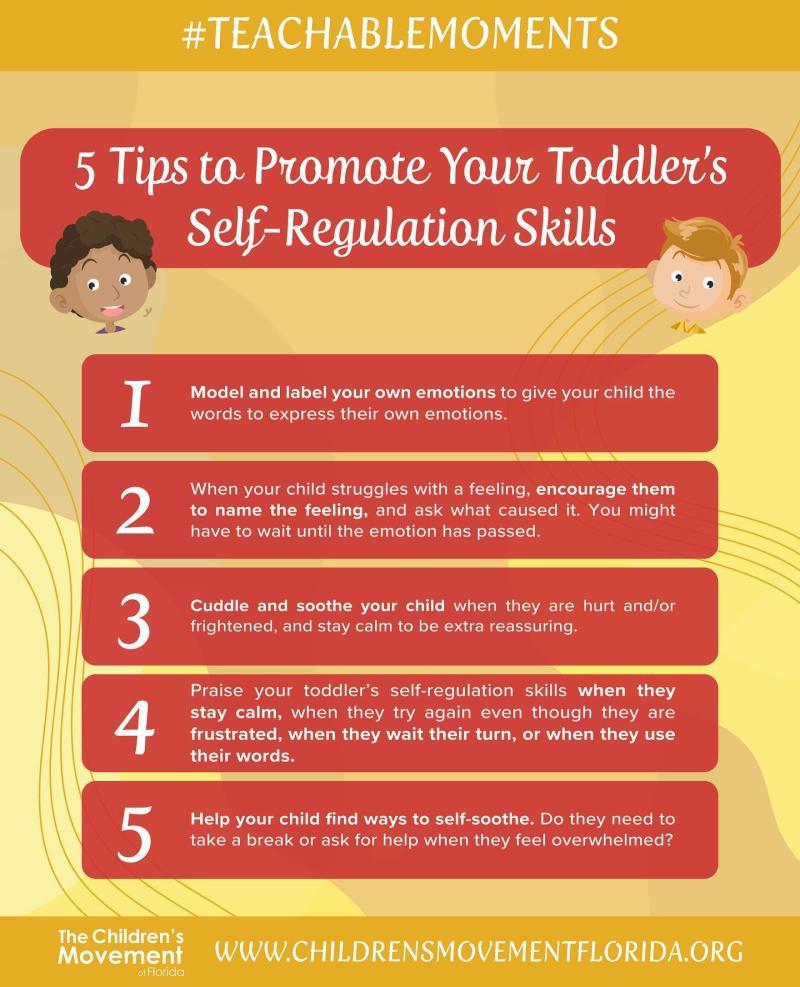
5 Tips to Promote Your Toddler's Self-Regulation Skills
- Model and label your own emotions to give your child the words to express their own emotions.
- When your child struggles with a feeling, encourage them to name the feeling, and ask what caused it. You might have to wait until the emotion has passed.
- Cuddle and soothe your child when they are hurt and/or frightened, and stay calm to be extra reassuring.
- Praise your toddler's self-regulation skills when they stay calm, when they try again even though they are frustrated, when they wait their turn, or when they use their words.
- Help your child find ways to self-soothe. Do they need to take a break or ask for help when they feel overwhelmed?
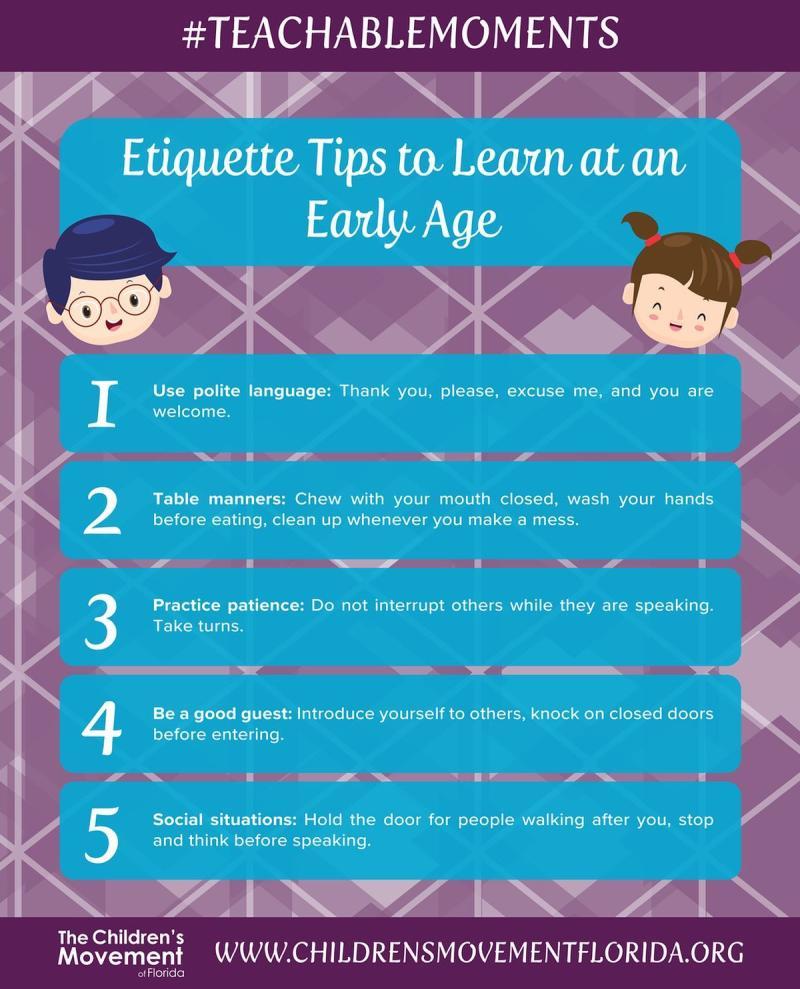
Etiquette Tips to Learn at an Early Age
- Use polite language: Thank you, please, excuse me, and you are welcome.
- Table manners: Chew with your mouth closed, wash your hands before eating, clean up whenever you make a mess.
- Practice patience: Do not interrupt others while they are speaking. Take turns.
- Be a good guest: Introduce yourself to others, knock on closed doors before entering.
- Social situations: Hold the door for people walking after you, stop and think before speaking.
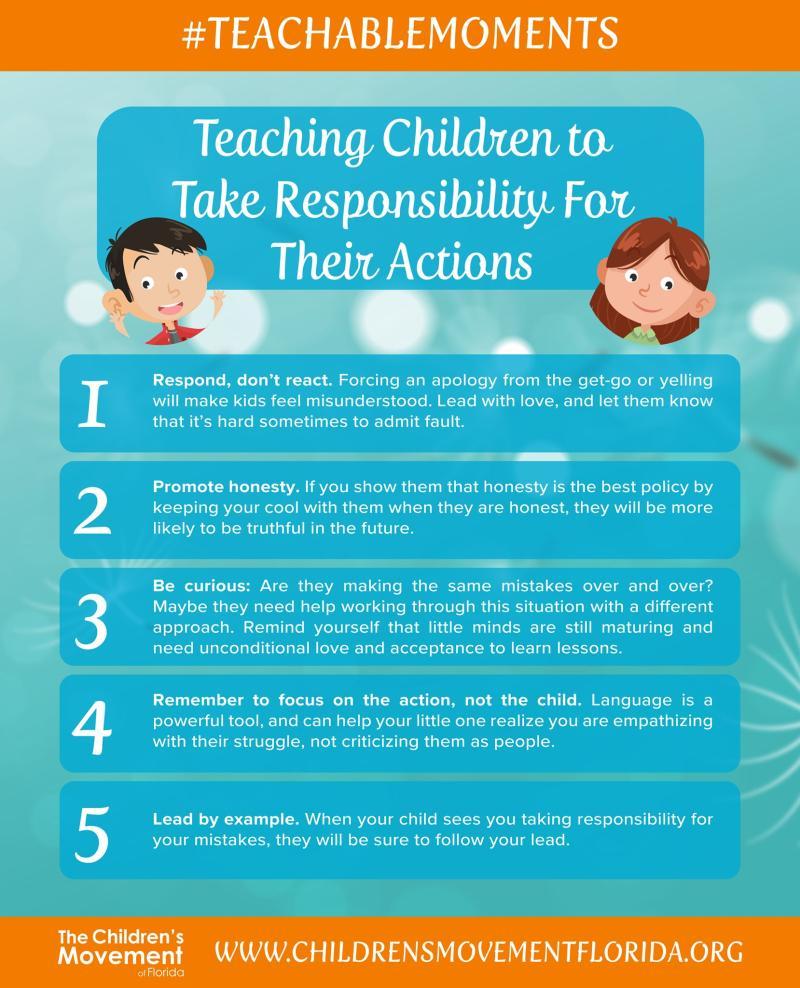
Teaching Children to Take Responsibility For Their Actions
- Respond, don't react. Forcing an apology from the get-go or yelling will make kids feel misunderstood. Lead with love, and let them know that i t's hard sometimes to admit fault.
- Promote honesty. If you show them that honesty is the best policy by keeping your cool with them when they are honest, they will be more likely to be truthful in the future.
- Be curious: Are they making the same mistakes over and over? Maybe they need help working through this situation with a different approach. Remind yourself that little minds are still maturing and need unconditional love and acceptance to learn lessons.
- Remember to focus on the action, not the child. Language is a powerful tool, and can help your little one realize you are empathizing with their struggle, not criticizing them as people.
- Lead by example. When your child sees you taking responsibility for your mistakes, they will be sure to follow your lead.
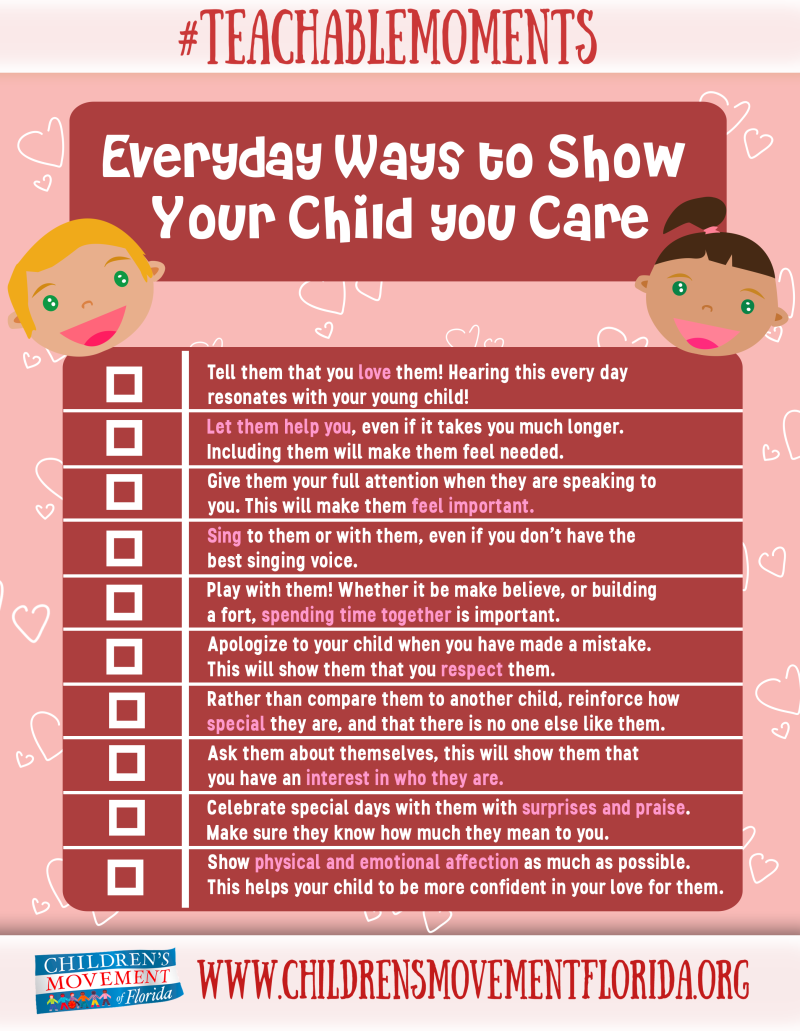
Everyday Ways To Show Your Child You Care
- Tell them that you love them! Hearing this every day resonates with your young child!
- Let them help you, even if it takes you much longer. Including them will make them feel needed.
- Give them your full attention when they are speaking to you. This will make them feel important.
- Sing to them or with them, even if you don't have the best singing voice.
- Play with them! Whether it be make believe, or building a fort, spending time together is important.
- Apologize to your child when you have made a mistake. This will show them that you respect them.
- Rather than compare them to another child, reinforce how special they are, and that there is no one else like them.
- Ask them about themselves. This will show them that you have an interest in who they are.
- Celebrate special days with them with surprises and praise. Make sure they know how much they mean to you.
- Show physical and emotional affection as much as possible. This helps you child to be more confident in your love for them.
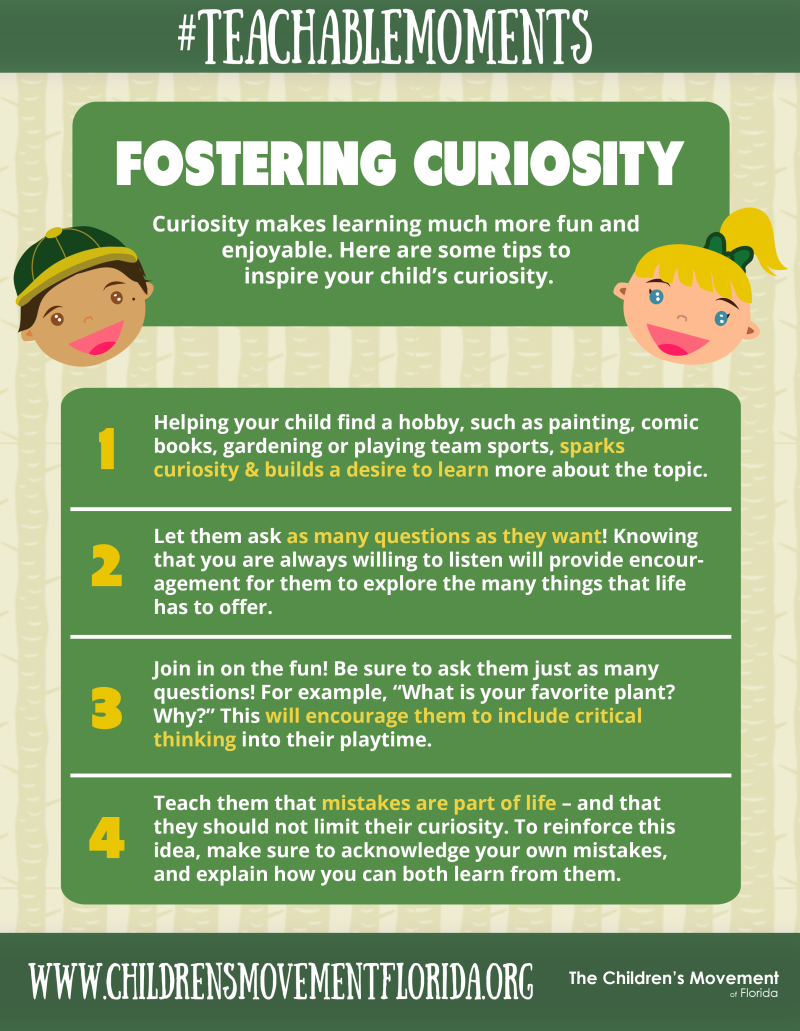
Fostering Curiosity
Curiosity makes learning much more fun and enjoyable. Here are some tips to inspire our child's curiosity.
- Helping your child find a hobby, such as painting, comic books, gardening or playing team sports, sparks curiosity and builds a desire to learn more about the topic.
- Let them ask as many questions as they want! Knowing that you are always willing to listen will provide encouragement for them to explore the many things that life has to offer.
- Join in on the fun! Be sure to ask them just as many questions! For example, "What is your favorite plant? Why?" This will encourage them to include critical thinking into their playtime.
- Teach them that mistakes are part of life -- and that they should not limit their curiosity. To reinforce this idea, make sure to acknowledge your own mistakes, and explain how you can both learn from them.
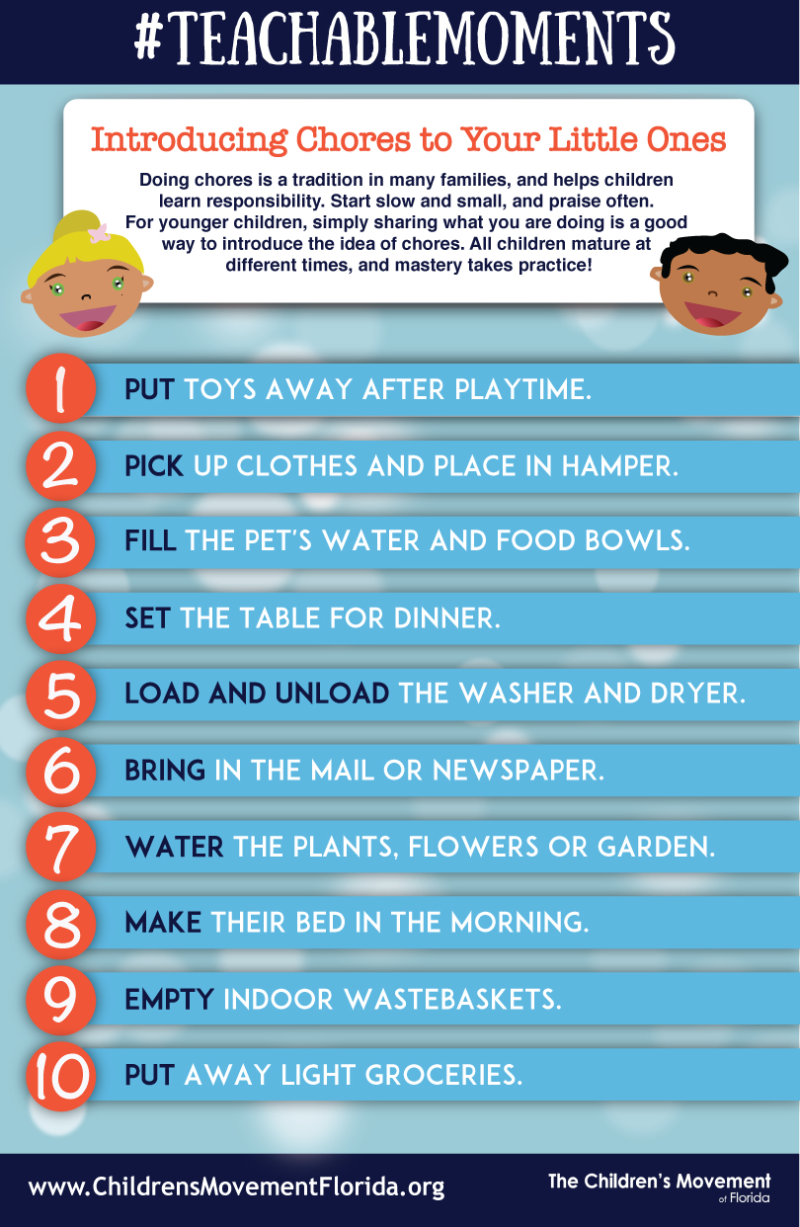
Introducing Chores to Your Little Ones
- Put toys away after playtime.
- Pick up clothes and place in hamper.
- Fill the pet's water and food bowls.
- Set the table for dinner.
- Load and unload the washer and dryer.
- Bring in the mail or newspaper.
- Water the plants, flowers or garden.
- Make their bed in the morning.
- Empty indoor wastebaskets.
- Put away light groceries.

Minding Our Manners
Practicing proper manners is a key way to show that you have respect for others. Below you will find some meaningful tips to raising a child who "minds their manners."
- Start teaching your child the importance of good manners at a young age. You want manners to become a habit regardless of the occasion or location.
- Always say please and thank you when asking your child for something. Your child will follow your lead!
- When teaching table manners, make sure to emphasize the more important once first, such as chewing with their mouth closed, elbows off the table, and napkin on their lap.
- Polite social cues are a skill that children can carry into adulthood. For example, waiting their turn to speak shows respect for others.
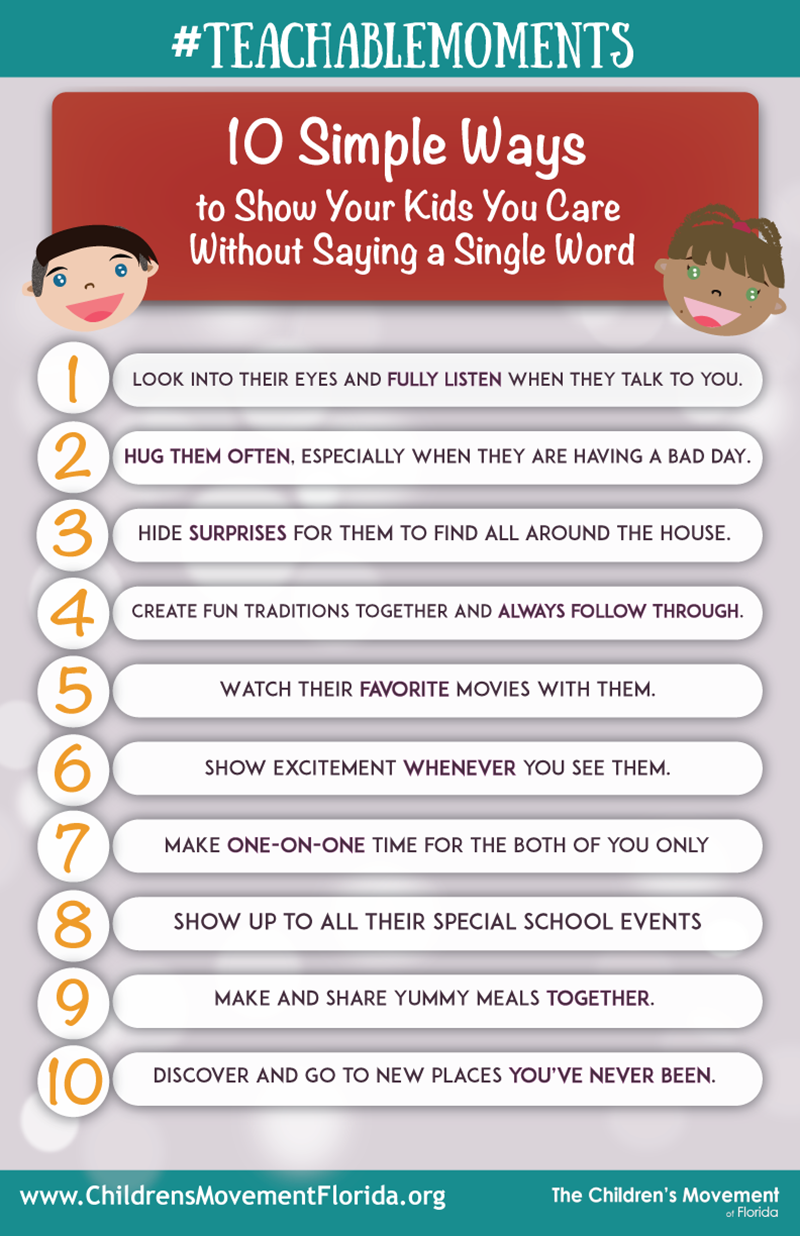
10 Simple Ways to Show Your Kids You Care Without Saying a Single Word
- Look into their eyes and fully listen when they talk to you.
- Hug them often, especially when they are having a bad day.
- Hide surprises for them to find all around the house.
- Create fun traditions together and always follow through.
- Watch their favorite movies with them.
- Show excitement whenever you see them.
- Make one-on-one time for the both of you only.
- Show up to all their special school events.
- Make and share yummy meals together.
- Discover and go to new places you've never been.
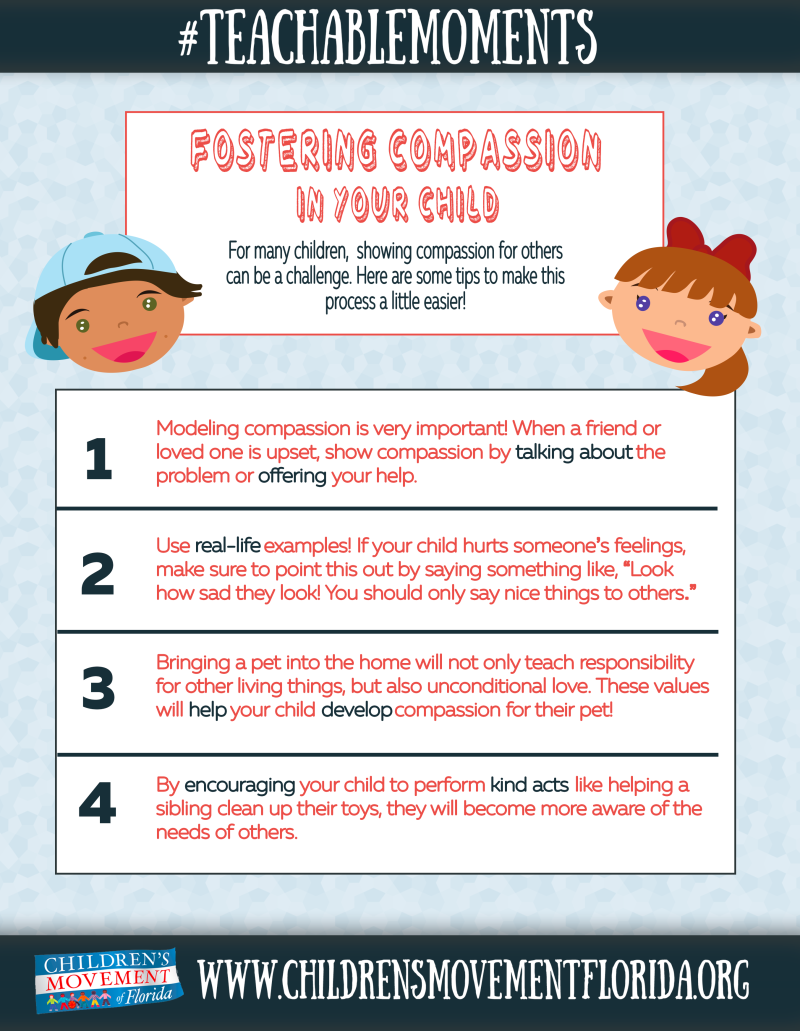
Fostering Compassion in Your Child
For many children, showing compassion for others can be a challenge. Here are some tips to make this process a little easier!
- Modeling compassion is very important! When a friend or loved one is upset, show compassion by taking about the problem or offering your help.
- Use real-life examples! If your child hurts someone's feelings, make sure to point this out by saying something like, "Look how sad they look! You should only say nice things to others."
- Bringing a pet into the home will not only teach responsibility for other living things, but also unconditional love. these values will help your child develop compassion for their pet!
- By encouraging our child to perform kind acts like helping a sibling clean up their toys, they will become more aware of the needs of others.

10 Family-Friendly Activities for Summer
- Go on a nature scavenger hunt and share your findings together.
- Lay out a blanket in the yard on a clear night and stargaze.
- Play hide-and-seek with the neighborhood kids.
- Draw on the patio, sidewalk or driveway with colored chalk.
- Play in the sprinklers on a hot, sunny day.
- Go for a drive together and let your kids pick the music.
- Make a bonfire...and don't forget the s'mores!
- Ride a scooter, boke or stroller around the block.
- Take an evening stroll, around the neighborhood with your pet.
- Pack a picnic together and go to the closest park.
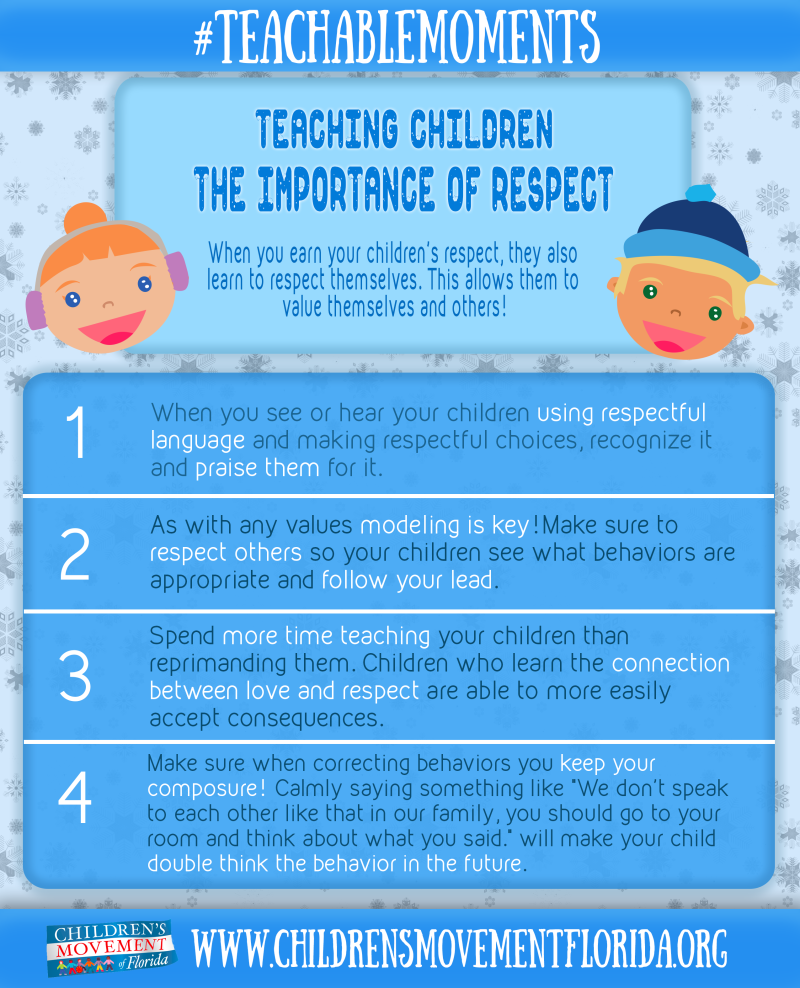
Teaching Children The Importance of Respect
When you earn your child's respect, they also learn to respect themselves. This allows them to value themselves and others!
- When you see or hear your children using respectful language and making respectful choices, recognize it and praise them for it.
- As with any values, modeling is key! Make sure to respect others so your children see what behaviors are appropriate and follow your lead.
- Spend more time teaching your children than reprimanding them. Children who learn the connection between love and respect are able to more easily accept consequences.
- Make sure when correcting behaviors you keep your composure! Calmly saying something like "We don't speak to each other like that in our family, you should go to your room and think about what you said" will make your child double think the behavior in the future.
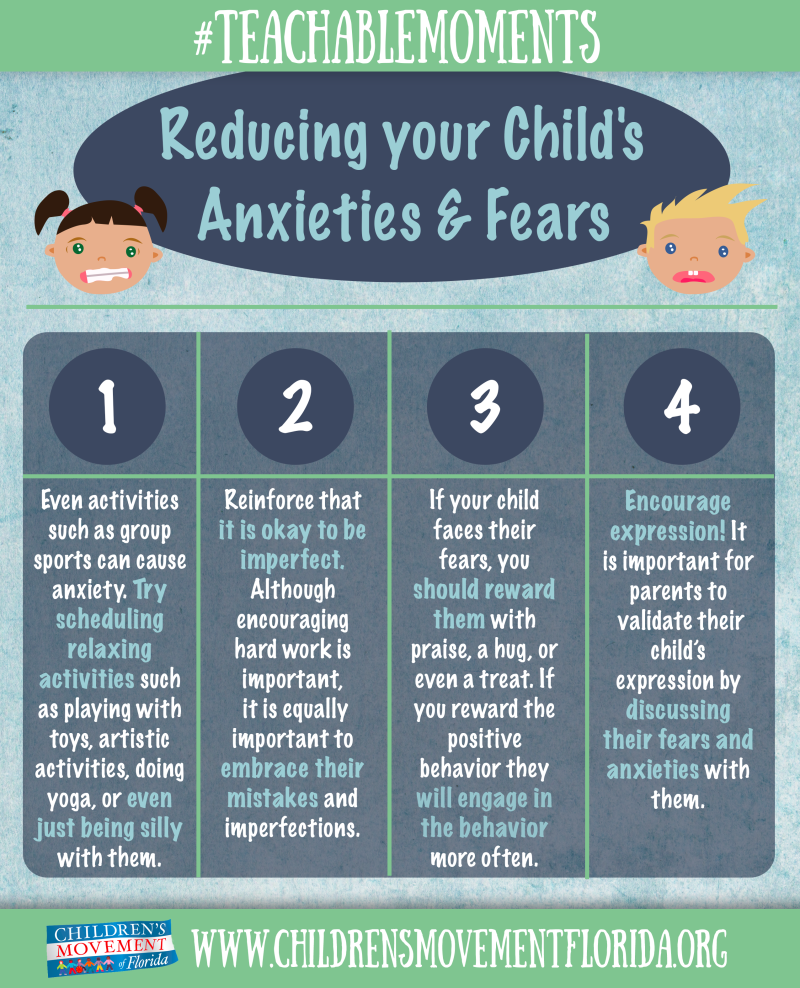
Reducing Your Child's Anxieties & Fears
- Even activities such as group sports can cause anxiety. Try scheduling relaxing activities such as playing with toys, artistic activities, doing yoga, or even just being silly with them.
- Reinforce that it is okay to be imperfect. Although encouraging hard work is important, it is equally important to embrace their mistakes and imperfections.
- If your child faces their fears, you should reward them with praise, a hug, or even a treat. If you reward the positive behavior they will engage in the behavior more often.
- Encourage expression! It is important for parents to validate their child's expression by discussing their fears and anxieties with them.
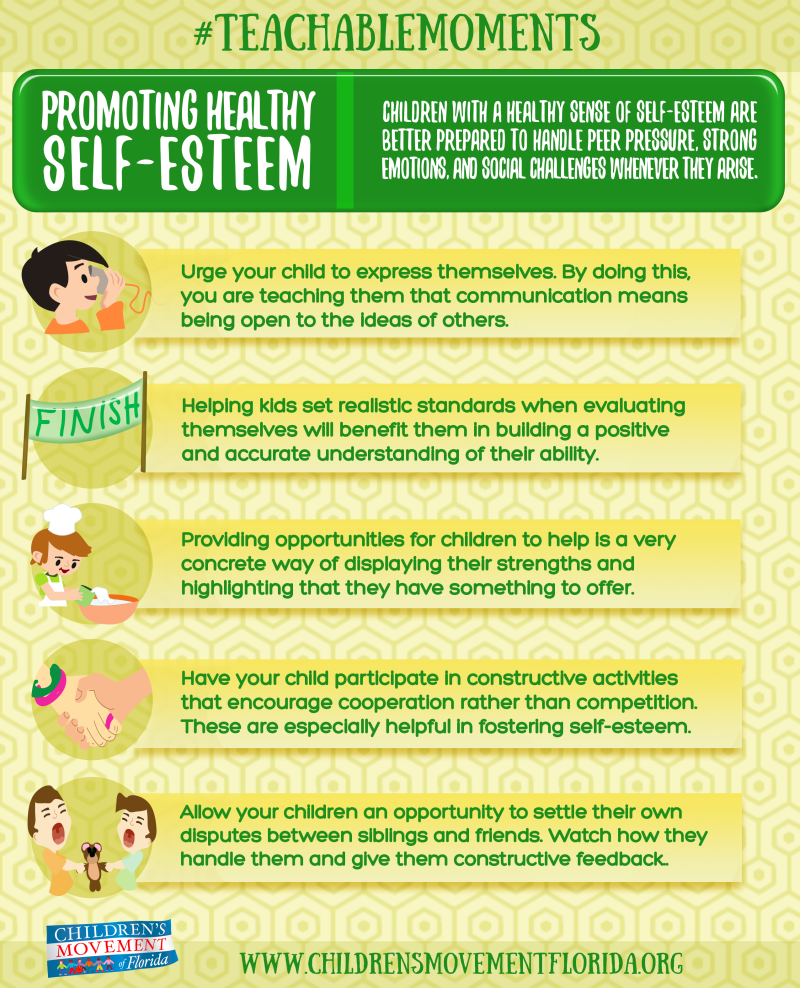
Promoting Healthy Self-Esteem
- Urge your child to express themselves. By doing this, you are teaching them that communication means being open to the ideas of others.
- Helping kids set realistic standards when evaluating themselves will benefit them in building a positive and accurate understanding of their ability.
- Providing opportunities for children to help is a very concrete way of displaying their strengths and highlighting that they have something to offer.
- Have your child participate in constructive activities that encourage cooperation rather than competition. These are especially helpful in fostering self-esteem.
- Allow your children an opportunity to settle their own disputes between siblings and friends. Watch how they handle them and give them constructive feedback.
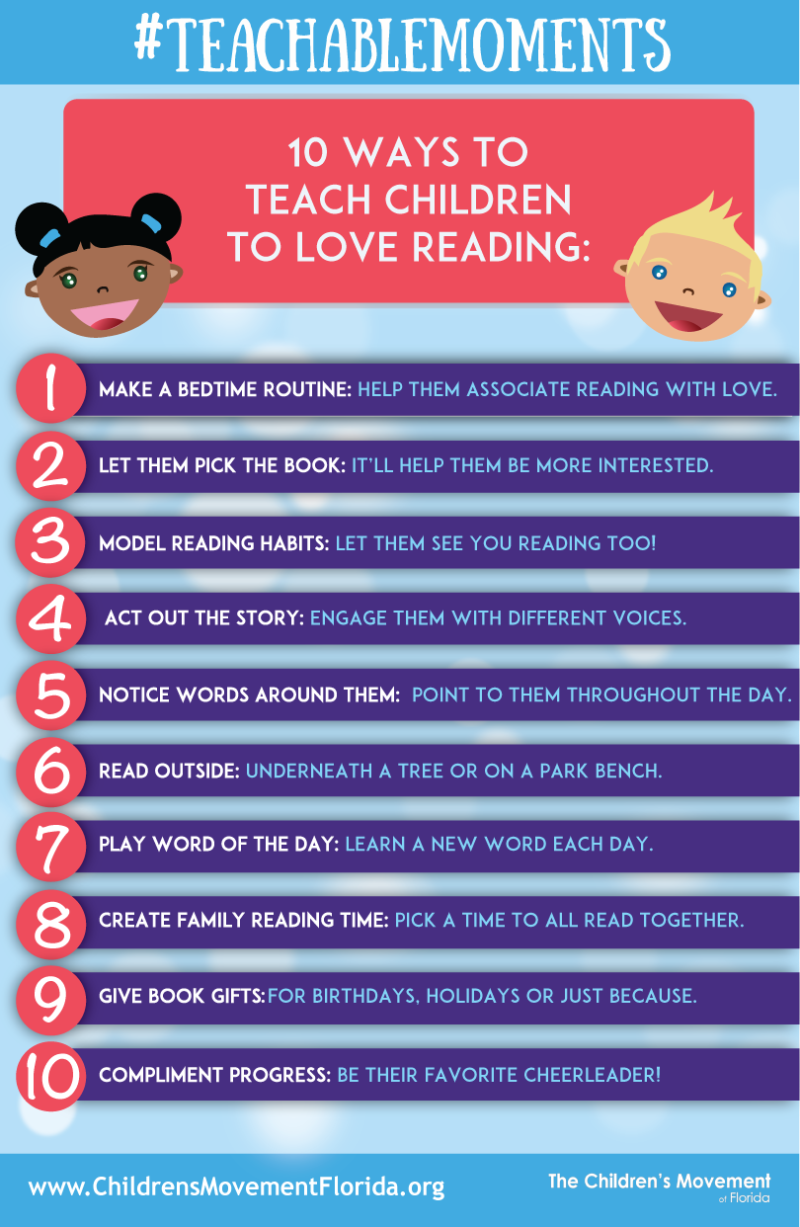
10 Ways to Teach Children to Love Reading
- Make a bedtime routine: Help them associate reading with love.
- Let them pick the book: It'll help them be more interested.
- Model reading habits: Let them see you reading too!
- Act out the story: Engage them with different voices.
- Notice words around them: Point to them throughout the day.
- Read outside: Underneath a tree or on a park bench.
- Play word of the day: Learn a new world each day.
- Create family reading time: Pick a time to all read together.
- Give book gifts: For birthdays, holidays or just because.
- Compliment progress: Be their favorite cheerleader!
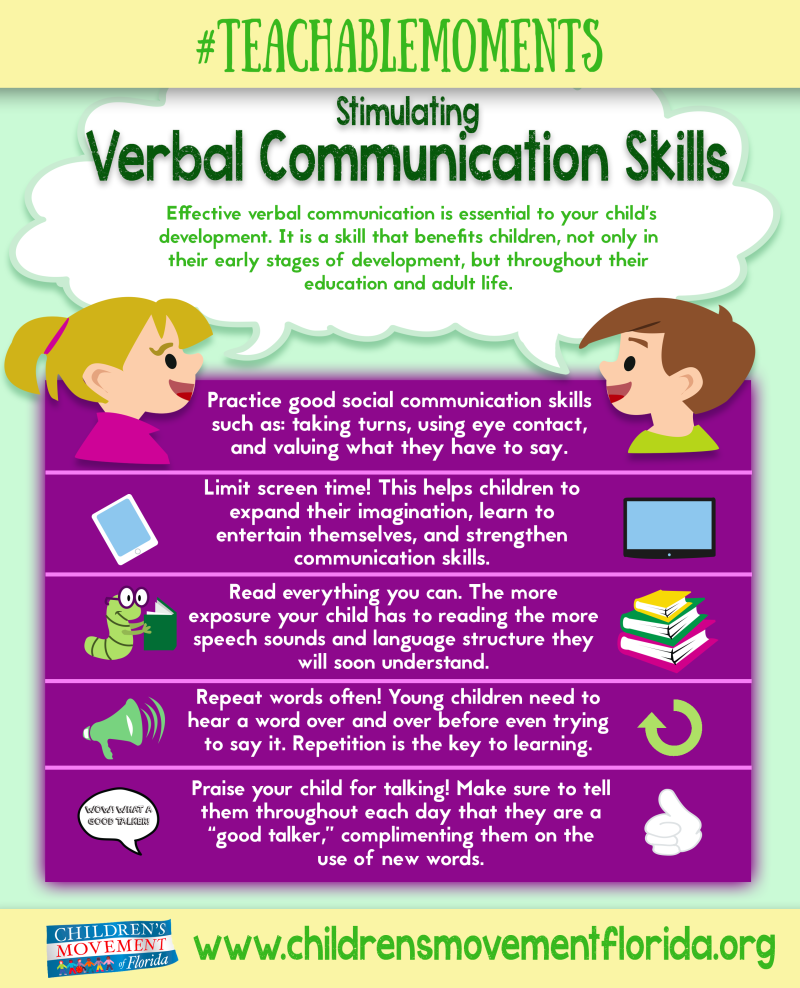
Stimulating Verbal Communication Skills
Effective verbal communication is essential to your child's development. It is a skill that benefits children, not only in their early stages of development, but throughout their education and adult life.
- Practice good social communication skills such as: taking turns, using eye contact, and valuing what they have to say.
- Limit screen time! This helps children to expand their imagination, learn to entertain themselves, and strengthen communication skills.
- Read everything you can. The more exposure your child has to reading, the more speech sounds and language structure they will soon understand.
- Repeat words often! Your children need to hear a word over and over before even trying to say it. Repetition is the key to learning.
- Praise your child for talking! Make sure to tell them throughout each day that they are a "good talker," complimenting them on the use of new words.
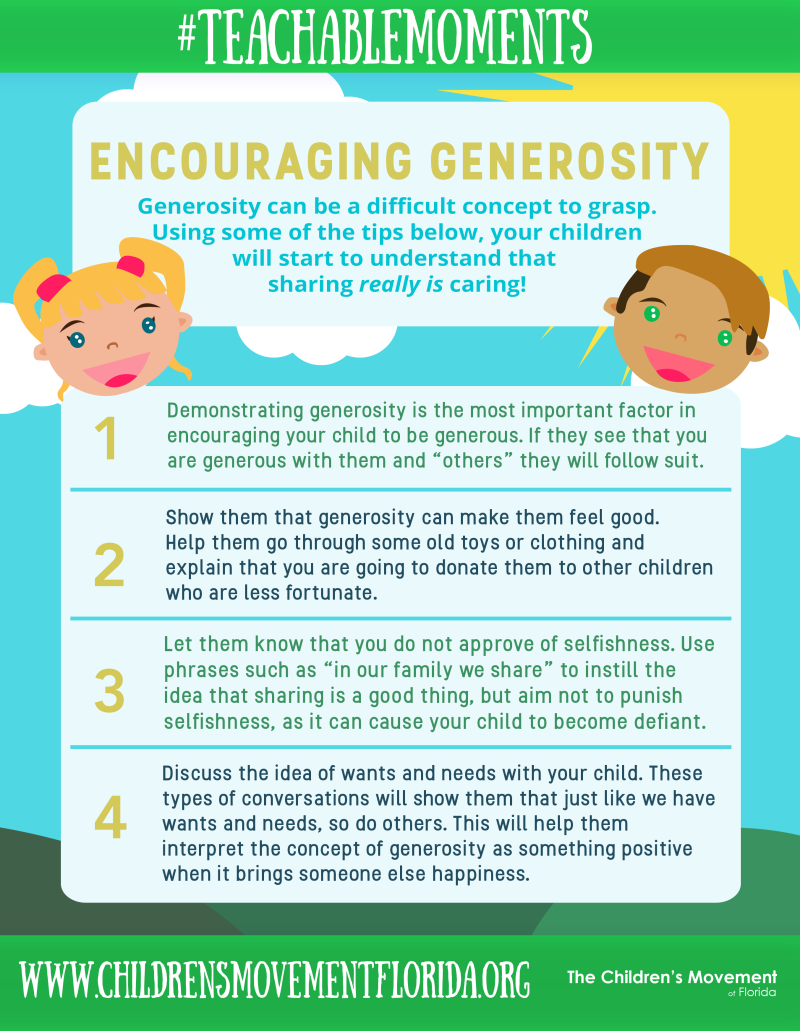
Encouraging Generosity
- Demonstrating generosity is the most important factor in encouraging your child to be generous. If they see that you are generous with them and "others", they will follow suit.
- Show them that generosity can make them feel good. Help them go through some old toys or clothing and explain that you are going to donate them to other children who are less fortunate.
- Let them know that you do not approve of selfishness. Use phrases such as "in our family we share" to instill the idea that sharing is a good thing, but aim not to punish selfishness, as it can cause your child to become defiant.
- Discuss the idea of wants and needs with your child. These types of conversations will show them that just like we have wants and needs, so do others. This will help them interpret the concept of generosity as something positive when it brings someone else happiness.
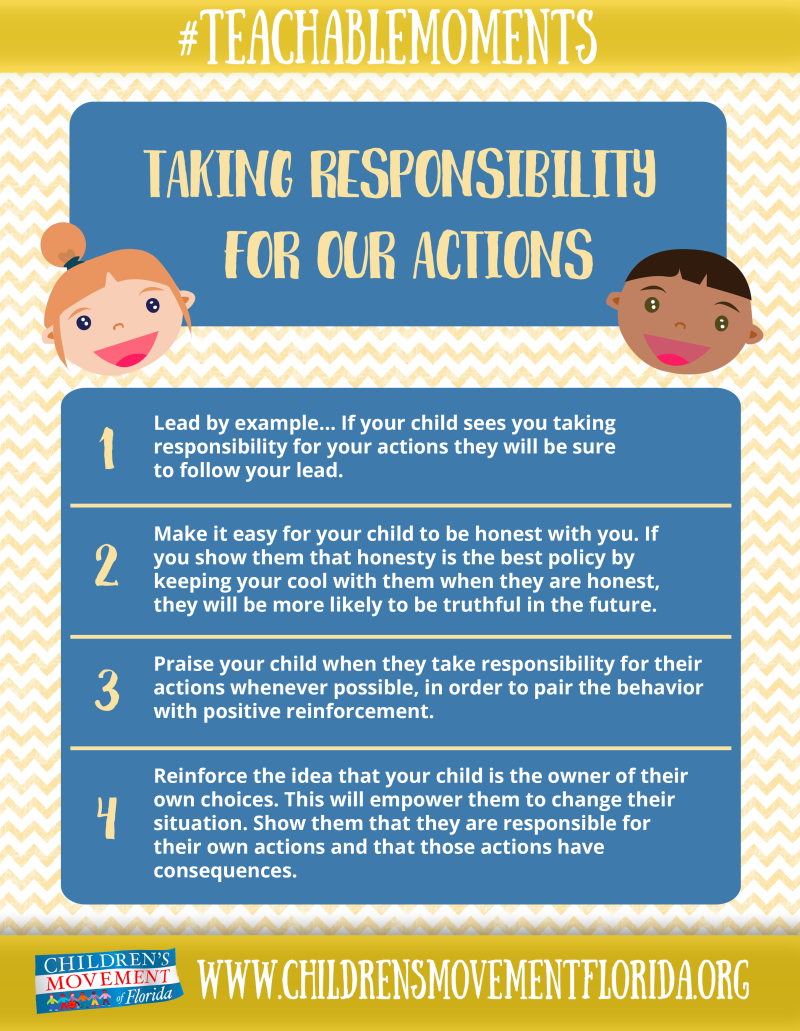
Taking Responsibility For Our Actions
- Lead by example... If your child sees you taking responsibility for your actions, they will be sure to follow your lead.
- Make it easy for your child to be honest with you. If you show them that honesty is the best policy by keeping your cool with them when they are honest, they will be more likely to be truthful in the future.
- Praise your child when they take responsibility for their actions whenever possible, in order to pair the behavior with positive reinforcement.
- Reinforce the idea that your child is the owner of their own choices. This will empower them to change their situation. Show them that they are responsible for their own actions and that those actions have consequences.
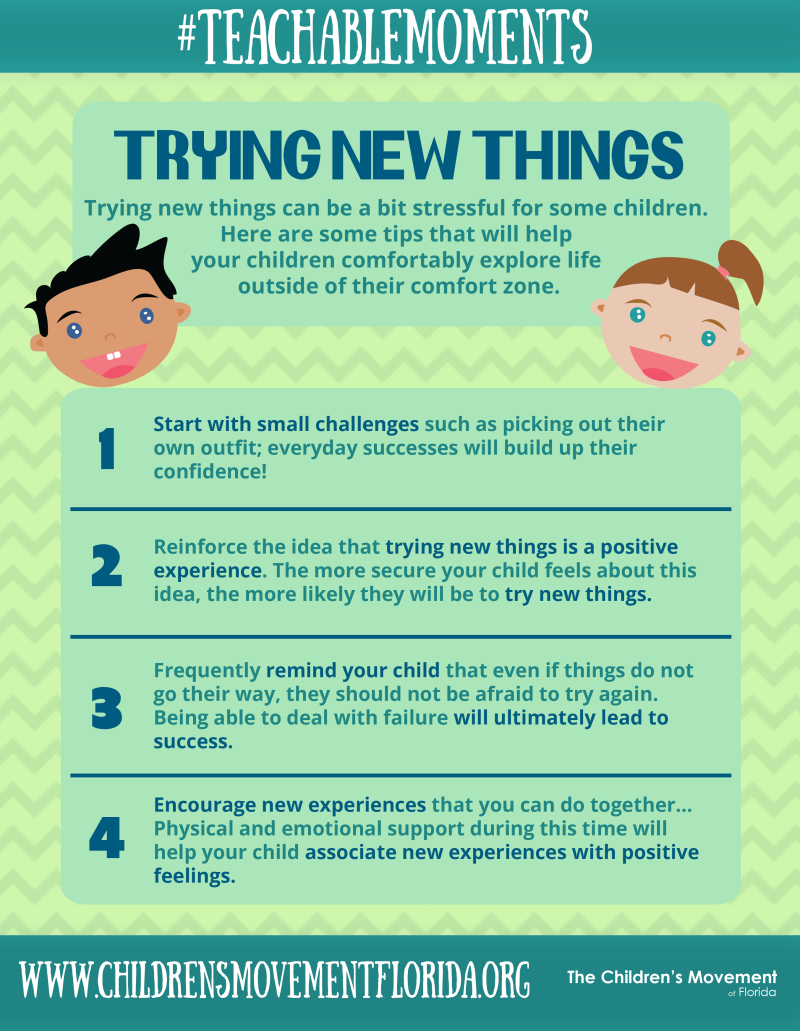
Trying New Things
Trying new things can be a bit stressful for some children. Here are some tips that will help your children comfortably explore life outside their comfort zone.
- Start with small challenges such as picking out their own outfit; everyday successes will build up their confidence!
- Reinforce the idea that trying new things is a positive experience. The more secure your child feels about this idea, the more likely they will be to try new things.
- Frequently remind your child that even if things do not go their way, they should not be afraid to try again. Being able to deal with failure will ultimately lead to success.
- Encourage new experiences that you can do together. Physical and emotional support during this time will help your child associate new experiences with positive feelings.

Teaching Gratitude This Holiday Season
- Creating awareness of the idea of gratitude is the first step in this process. This can start with something as small as teaching your child to say a simple thank you when someone gives them a gift or does something for them.
- Make sure to lead by example. If your child sees that you are thankful for the things and people you have in your life, they will follow your lead.
- Knowing the reasons behind our gratitude is just as important. Give your children an explanation of why we are grateful such as "I am grateful for my family because they love me and take care of me."
- Giving as a family is one of the best ways to teach gratitude! Donating to a canned food or a turkey drive on Thanksgiving is a great way to show your child that there are others less fortunate and they have so much to be grateful for!
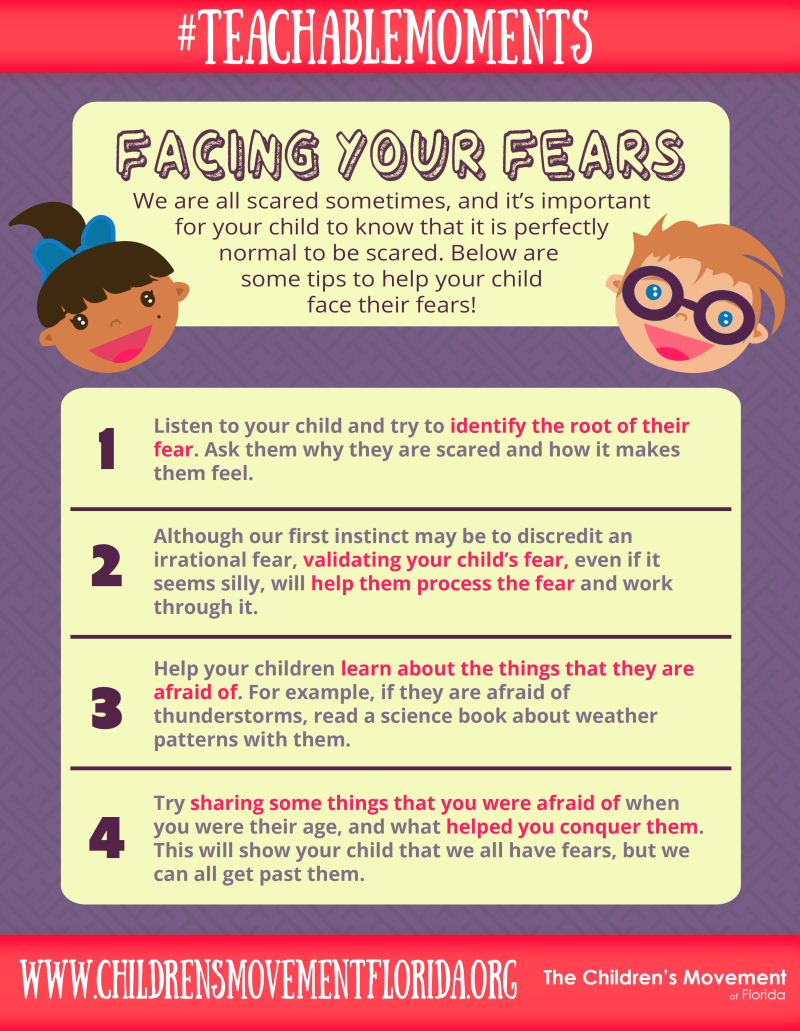
Facing Your Fears
We are all scared sometimes, and it's important for your child to know that it is perfectly normal to be scared. Below are some tips to help your child face their fears!
- Listen to your child and try to identify the root of their fear. Ask them why they are scared and how it makes them feel.
- Although our first instinct may be to discredit an irrational fear, validating your child's fear, even if it seems silly, will help them process the fear and work through it.
- Help your child learn about the things that they are afraid of. For example, if they are afraid of thunderstorms, read a science book about weather patterns with them.
- Try sharing some things that you were afraid of when you were their age, and what helped you conquer them. This will show your child that we all have fears, but we can all get past them.
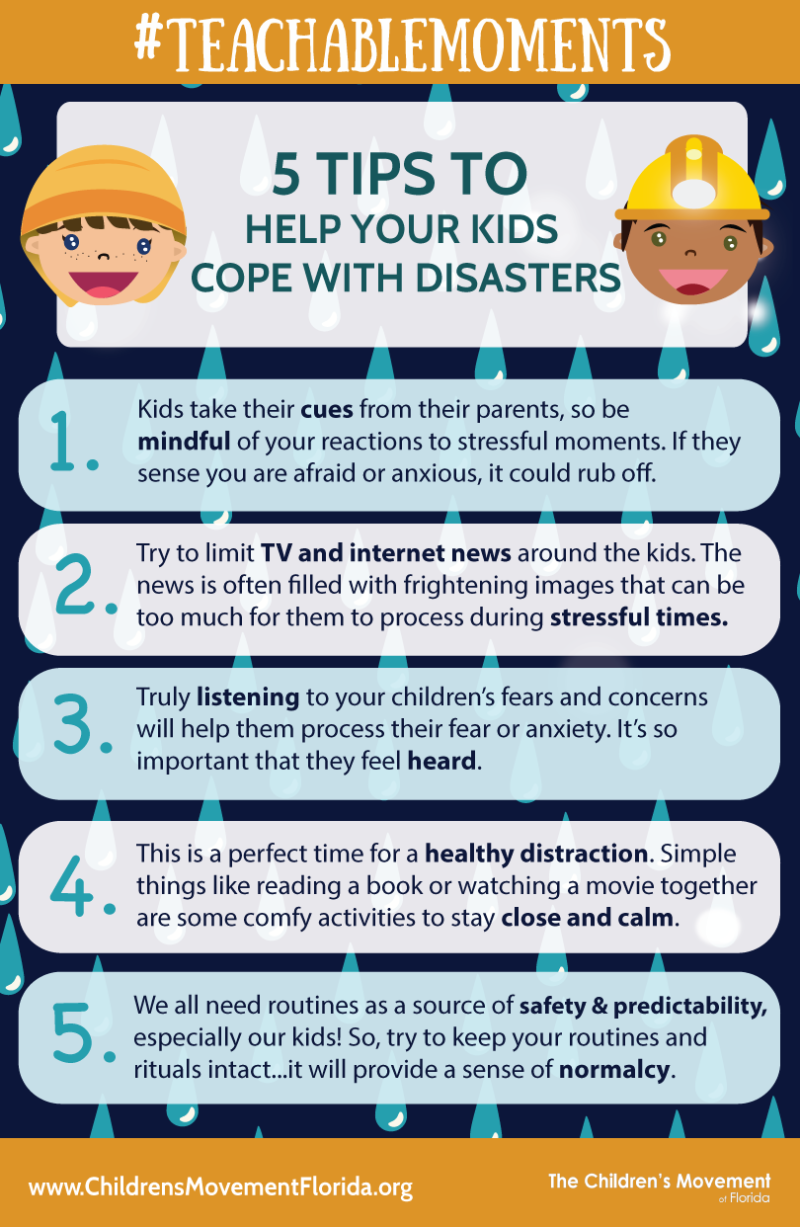
5 Tips to Help Your Kids Cope With Disasters
- Kids take their cues from their parents, so be mindful of your reactions to stressful moments. If they sense you are afraid or anxious, it could rub off.
- Try to limit TV and internet news around the kids. The news is often filled with frightening images that can be too much for them to process during stressful times.
- Truly listening to your children's fears and concerns will help them process their fear or anxiety. It's so important that they feel heard.
- This is a perfect time for a healthy distraction. Simple things like reading a book or watching a movie together are some comfy activities to stay close and calm.
- We all need routines as a source of safety & predictability, especially our kids! So, try to keep your routines and rituals intact....it will provide a sense of normalcy.
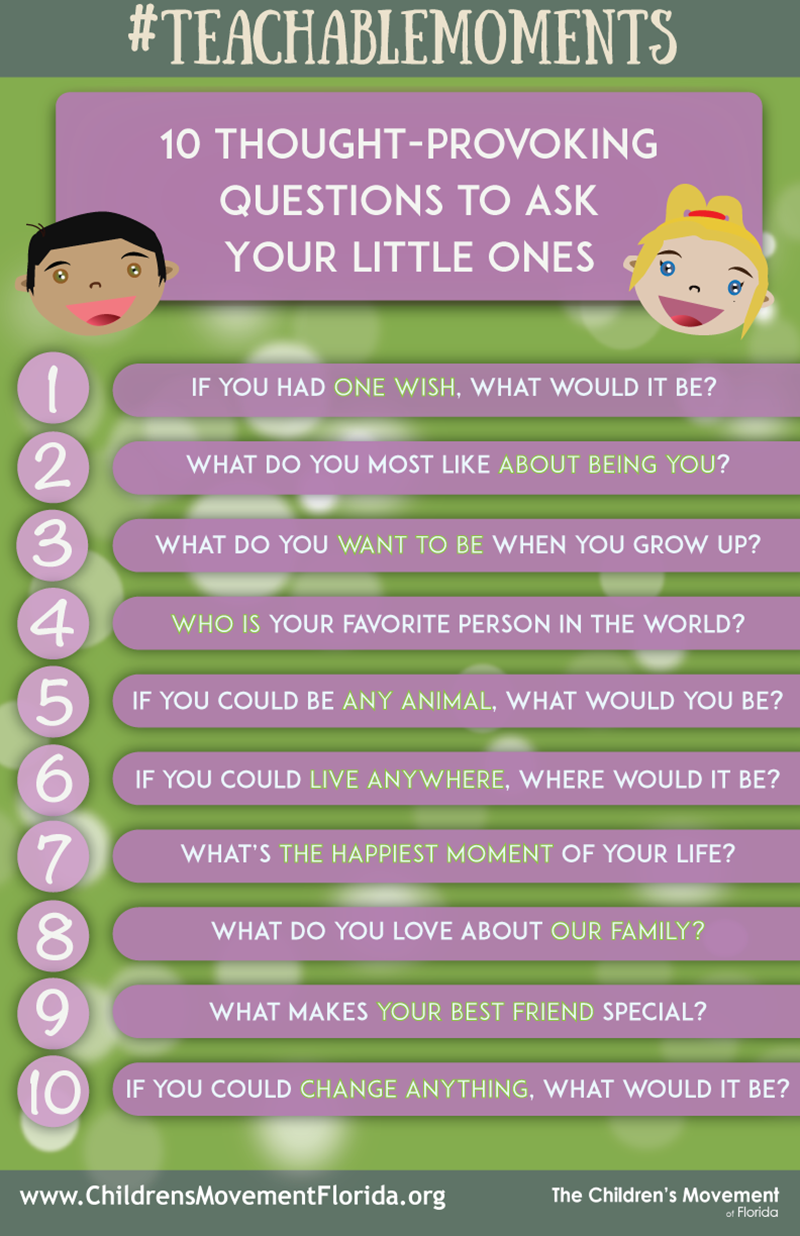
10 Thought-Provoking Questions to Ask Your Little Ones
- If you had one wish, what would it be?
- What do you most like about being you?
- What do you want to be when you grow up?
- Who is your favorite person in the world?
- If you could be any animal, what would you be?
- If you could live anywhere, where would it be?
- What's the happiest moment of your life?
- What do you love about our family?
- What makes your best friend special?
- If you could change anything, what would it be?
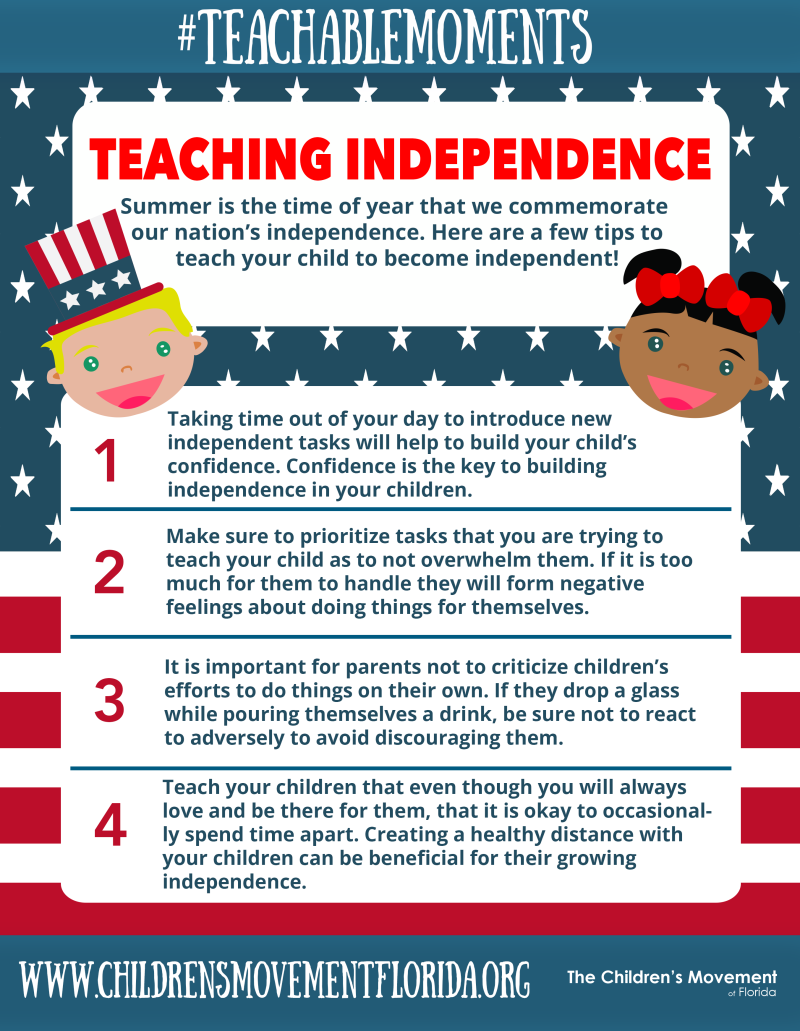
Teaching Independence
Summer is the time of year that we commemorate our nation's independence. Here are a few tips to teach your child to become independent!
- Taking time out of your day to introduce new independent tasks will help to build your child's confidence. Confidence is the key to building independence in your children.
- Make sure to prioritize tasks that you are trying to teach your child as to not overwhelm them. If it's too much for them to handle they will form negative feelings about doing things for themselves.
- It is important for parents not to criticize children's efforts to do things on their own. If they drop a glass while pouting themselves a drink, be sure not to reach too adversely to avoid discouraging them.
- Teach your children that even though you will always love and be there for them, that it is okay to occasionally spend time apart. Creating a healthy distance with your children can be beneficial for their growing independence.
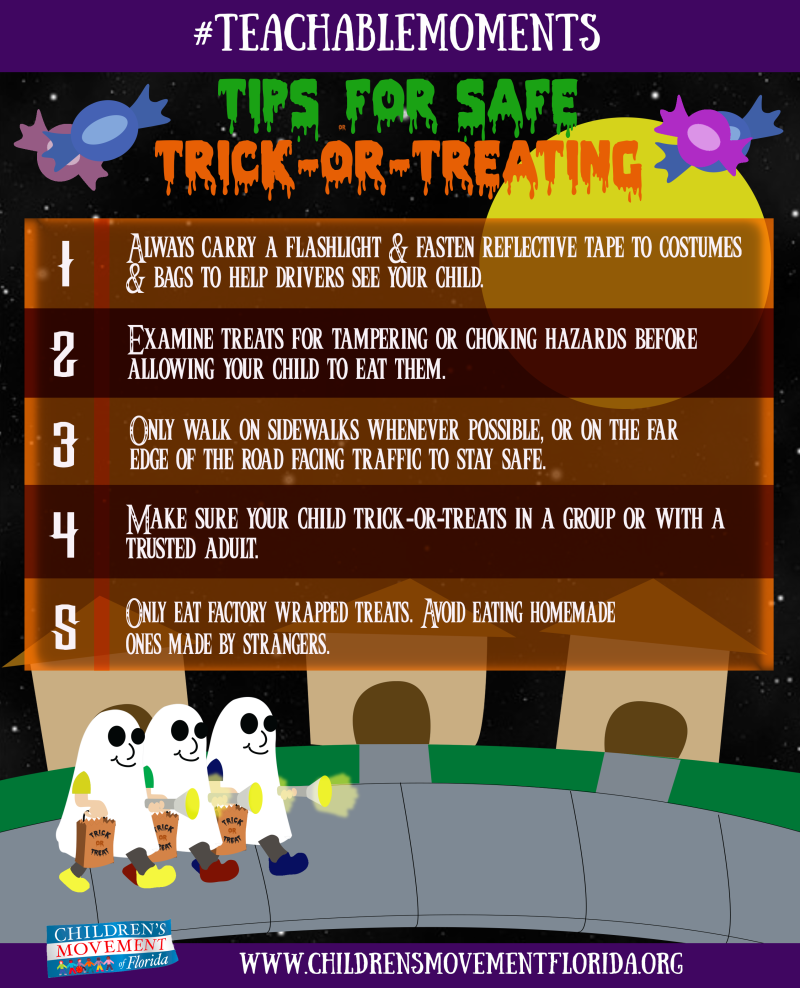
Tips for safe trick-or-treating
- Always carry a flashlight and fasten reflective tape to costumes and bags to help drivers see your child.
- Examine treats for tampering or choking hazards before allowing your child to eat them.
- Only walk on sidewalks whenever possible, or on the far edge of the road facing traffic to stay safe.
- Make sure your child trick-or-treats in a group or with a trusted adult.
- Only eat factory-wrapped treats. Avoid eating homemade ones made by strangers.
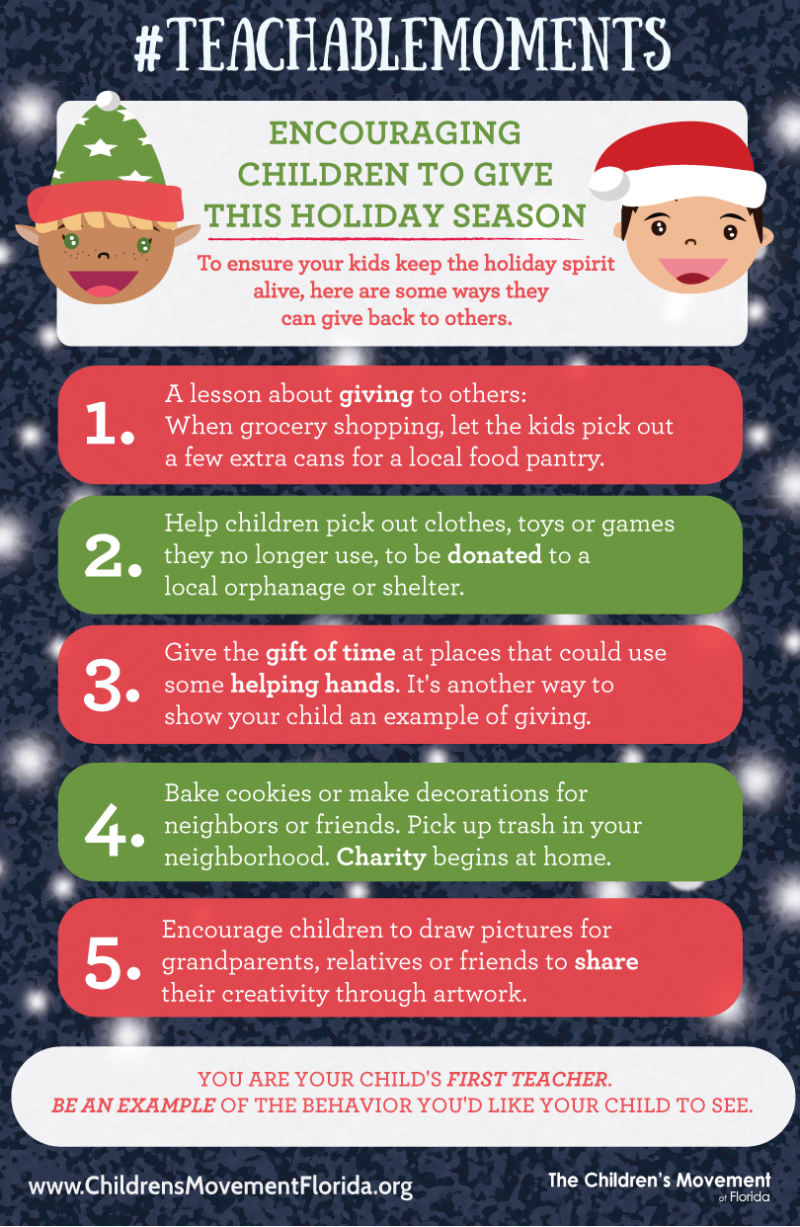
Encouraging Children To Give This Holiday Season
- A lesson about giving to others: When grocery shopping, let the kids pick out a few extra cans for a local food pantry.
- Help children pick out clothes, toys or games they no longer use, to be donated to a local orphanage or shelter.
- Give the gift of time at places that could use some helping hands. It's another way to show your child an example of giving.
- Bake cookies or make decorations for neighbors or friends. Pick up trash in your neighborhood. Charity begins at home.
- Encourage children to draw pictures for grandparents, relatives or friends to share their creativity through artwork.

10 Original Activities to Share With Your Children Over the Holidays
- Host a holiday movie night with friends and popcorn.
- Go outside in pajamas to make a wish upon a star.
- Take turns giving each other silly elf hairdos.
- Look up a new holiday recipe and bake it together.
- Surprise your children with their favorite treats.
- Share some of your cherished holiday memories.
- Hide a gift and plan a family holiday scavenger hunt.
- Take time to make holiday decorations together.
- Give them 10 reasons why you're thankful for them.
- Make a family holiday video and send to loved ones.
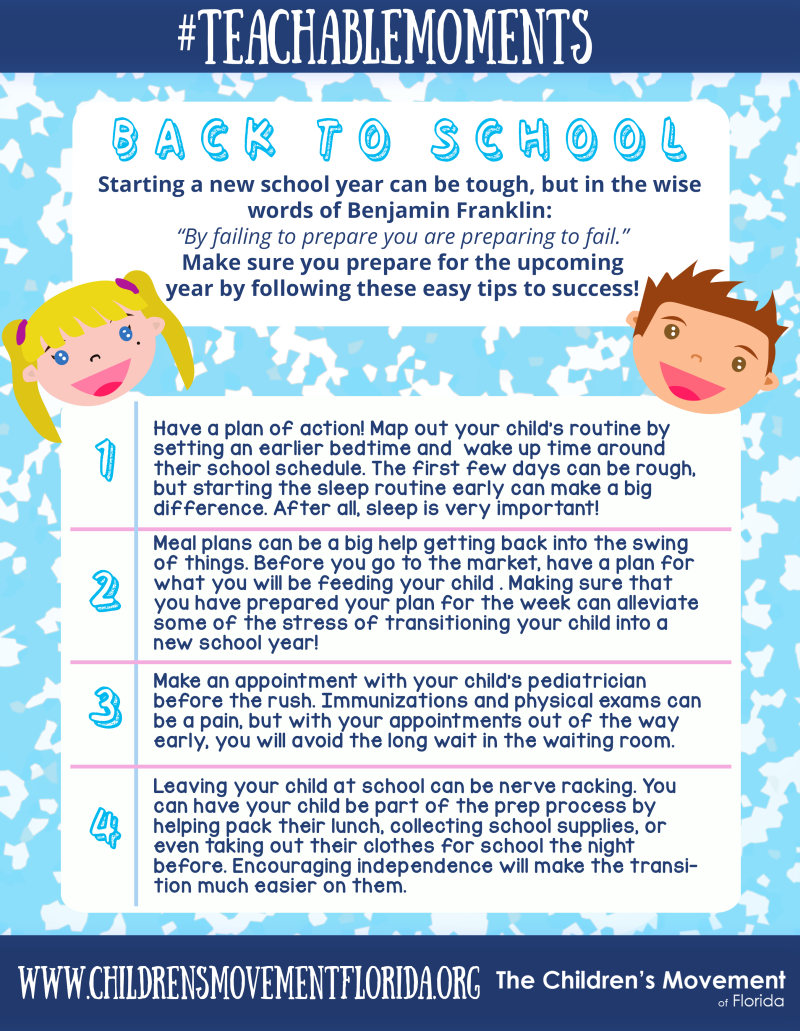
Back To School
- Have a plan of action! Map our your child's routine by setting an earlier bedtime and wake up time around their school schedule. The first few days can be rough, but starting the sleep routine early can make a big difference. After all, sleep is very important!
- Meal plans can be a big help getting back in to the swing of things. Before you go to the market, have a plan for what you will be feeding your child. Making sure that you have prepared your plan for the week can alleviate some of the stress of transitioning your child into a new school year!
- Make an appointment with your child's pediatrician before the rush. Immunizations and physical exams can be a pain, but with your appointments out of the way early, you will avoid the long wait in the waiting room.
- Leaving your child at school can be nerve racking. You can have your child be part of the prep process by helping pack their lunch, collecting school supplies, or even taking out their clothes for school the night before. Encouraging independence will make the transition much easier on them.
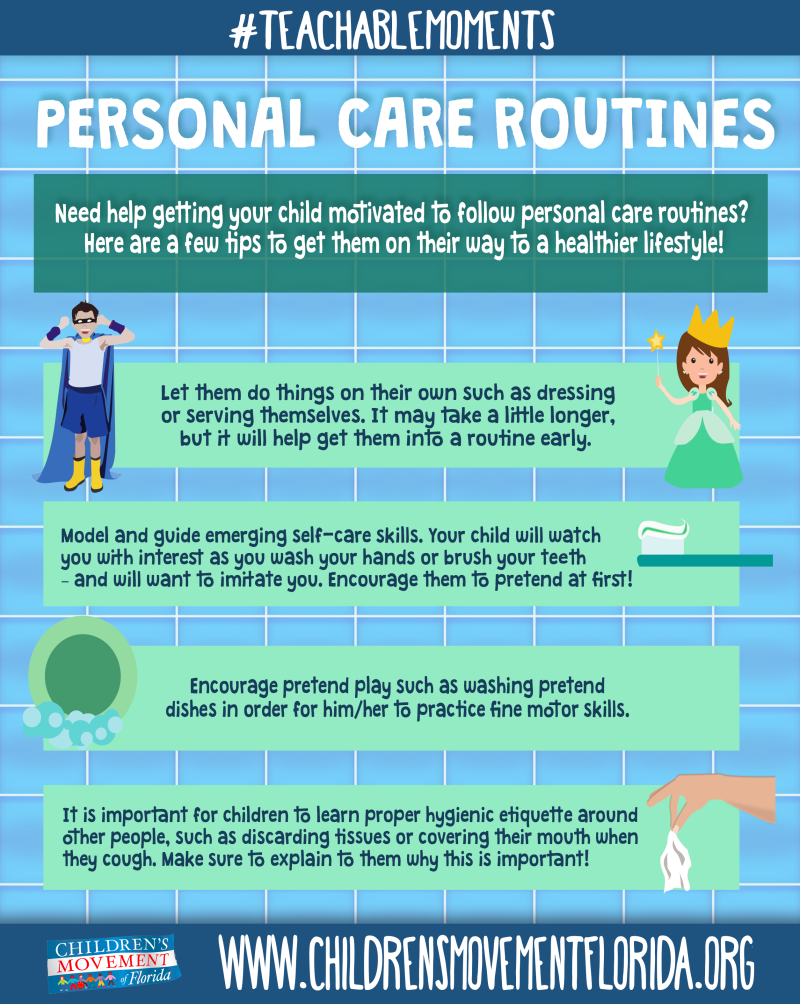
Personal Care Routines
Need help getting your child motivated to follow personal care routines? Here are a few tips to get them on their way to a healthier lifestyle!
- Let them do things on their own such as dressing or serving themselves. It may take a little longer, but it will help get them into a routine early.
- Model and guide emerging self-care skills. Your child will watch you with interest as you wash your hands or bush your teeth and will want to imitate you. Encourage them to pretend at first!
- Encourage pretend play such as washing pretend dishes in order for him/her to practice fine motor skills.
- It is important for children to learn proper hygienic etiquette around other people, such as discarding tissues or covering their mouth when they cough. Make sure to explain to them why this is important!
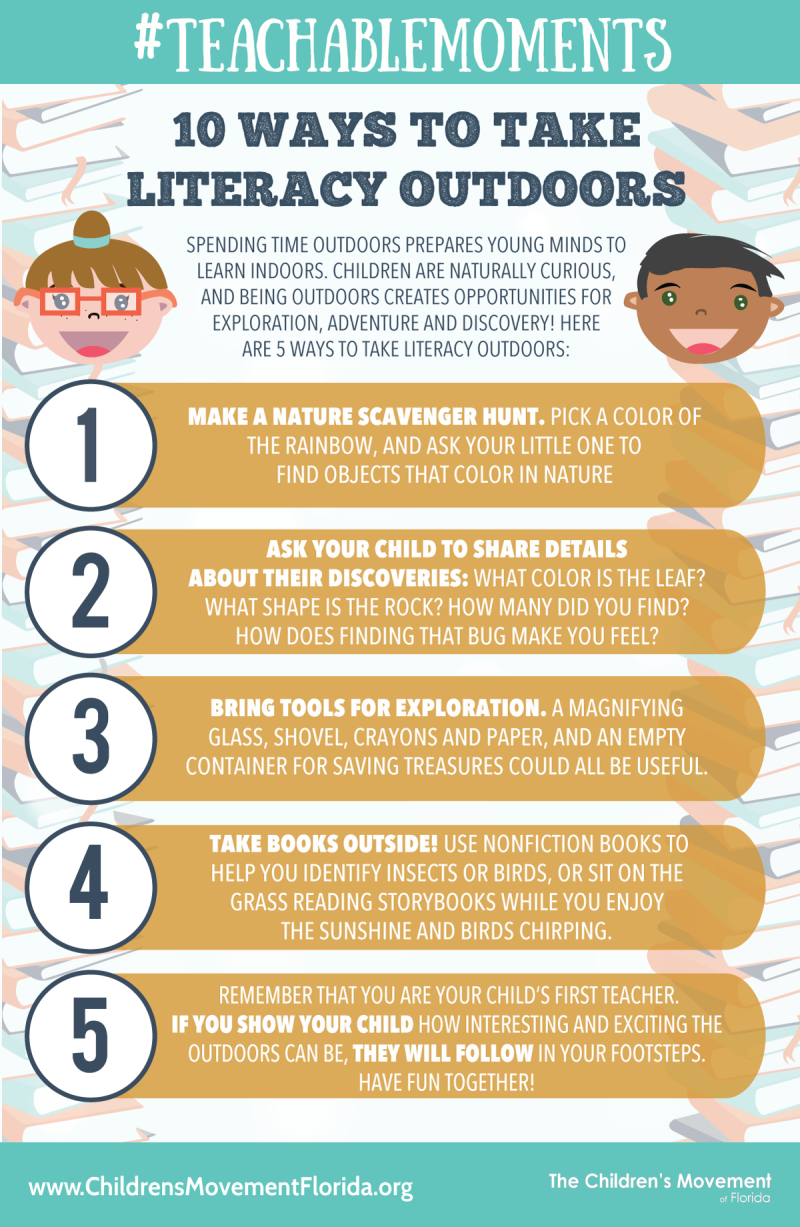
10 Ways to Take Literacy Outdoors
- Make a nature scavenger hunt. Pick a color of the rainbow, and ask your little one to find objects that color in nature.
- Ask your child to share details about their discoveries: What color is the leaf? what shape is the rock? How many did you find? How does finding that bug make you feel?
- Bring tools for exploration. A magnifying glass, shovel, crayons and paper, and an empty container for saving treasures could all be useful.
- Take books outside! Use nonfiction books to help you identify insects or birds, or sit on the grass reading storybooks while you enjoy the sunshine and birds chirping.
- Remember that you are your child's first teacher. If you show your child how interesting and exciting the outdoors can be, they will follow in your footsteps. Have fun together!
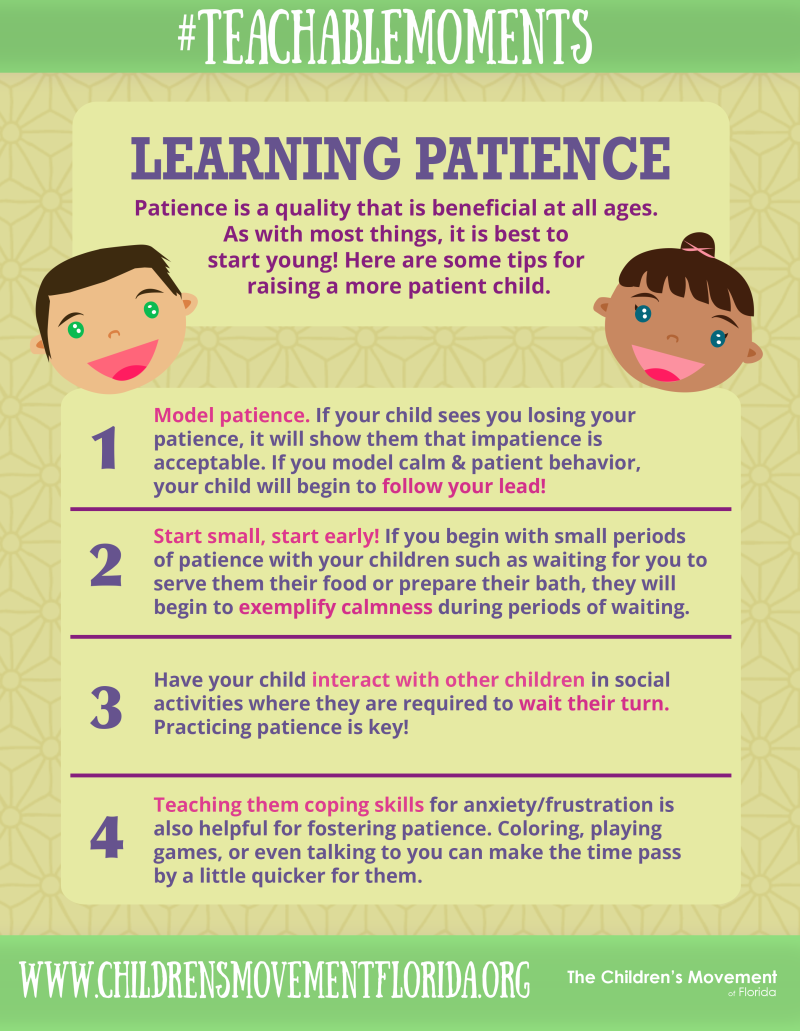
Learning Patience
Patience is a quality that is beneficial at all ages. As with most things, it is best to start young! Here are some tips for raising a more patient child.
- Model patience. If your child sees you losing your patience, it will show them that impatience is acceptable. If you model calm and patient behavior, your child will begin to follow your lead!
- Start small, start early! If you begin with small periods of patience with your children such as waiting for you to serve them their food or prepare their bath, they will begin to exemplify calmness during periods of waiting.
- Have your child interact with other children in social activities where they are required to wait their turn. Practicing patience is key!
- Teaching them coping skills for anxiety/frustration is also helpful for fostering patience. Coloring, playing games, or even talking to you can make the time pass by a little quicker for them.
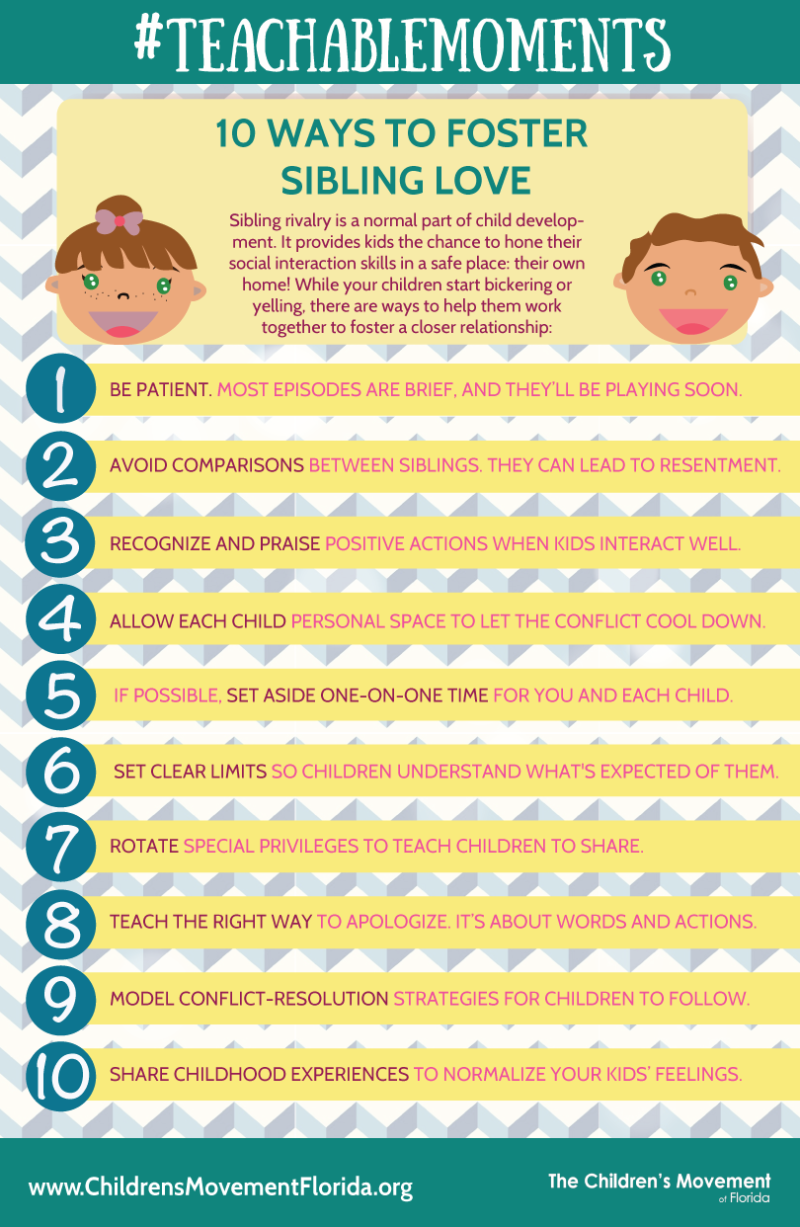
10 Ways to Foster Sibling Love
- Be patient. Most episodes are brief, and they'll be playing soon.
- Avoid comparisons between siblings. They can lead to resentment.
- Recognize and praise positive actions when kids interact well.
- Allow each child personal space to let the conflict cool down.
- If possible, set aside one-on-one time for you and each child.
- Set clear limits so children understand what's expected of them.
- Rotate special privileges to reach children to share.
- Teach the right way to apologize. It's about words and actions.
- Model conflict-resolution strategies for children to follow.
- Share childhood experiences to normalize your kids' feelings.
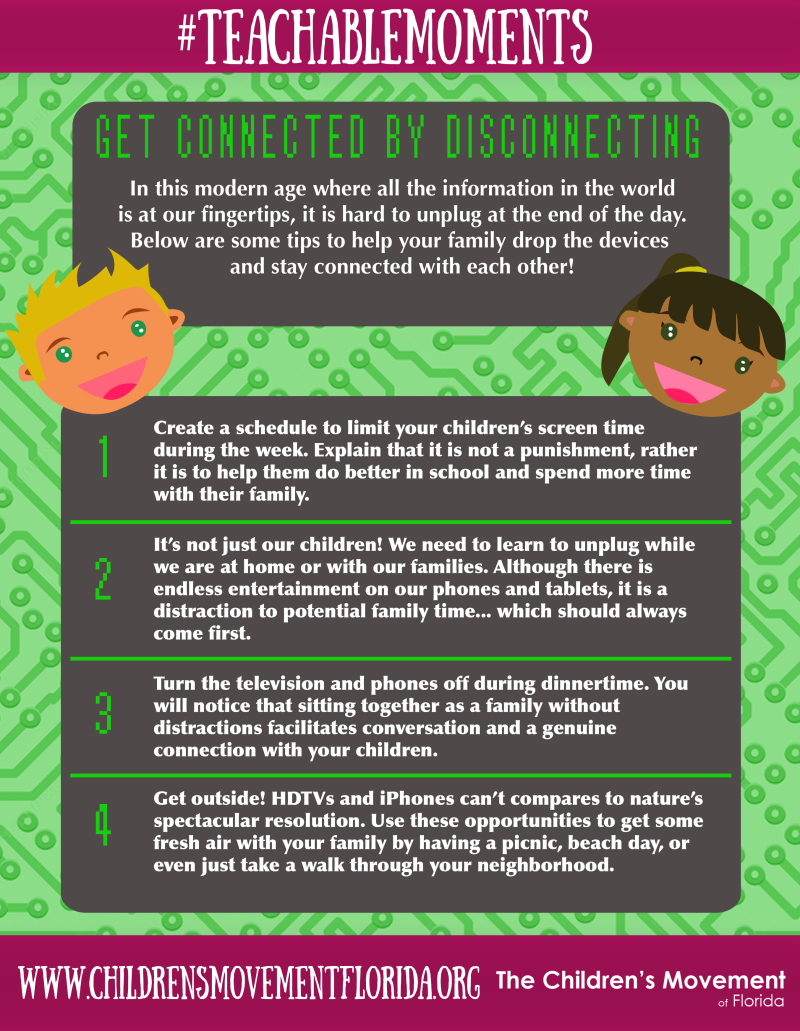
Getting Connected by Disconnecting
In this modern age where all the information in the world is at our fingertips, it is hard to unplug at the end of the day. Below are some tips to help your family drop the devices and stay connected with each other!
- Create a schedule to limit your children's screen time during the week. Explain that it is not a punishment, rather it is to help them do better in school and spend more time with their family.
- It's not just our children! We need to learn to unplug while we are at home or with our families. Although there is endless entertainment on our phones and tablets, it is a distraction to potential family time...which should always come first.
- Turn the television and phones off during dinnertime. You will notice that sitting together as a family without distractions facilitates conversation and a genuine connection with your children.
- Get outside! HDTVs and iPhones can't compare to nature's spectacular resolution. Use these opportunities to get some fresh air with your family by having a picnic, beach day, or even just take a walk through your neighborhood.
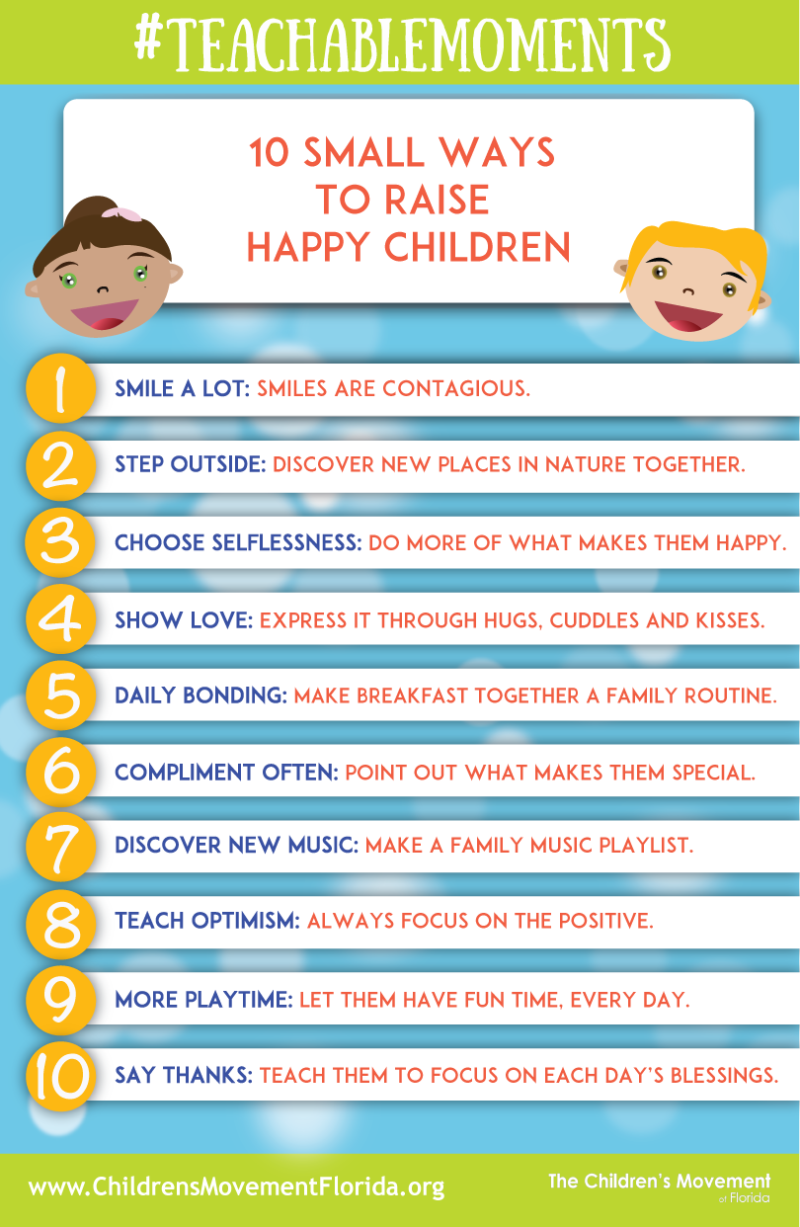
10 Small Ways to Raise Happy Children
- Smile a lot: Smiles are contagious.
- Step outside: Discover new places in nature together.
- Choose selflessness: Do more of what makes them happy.
- Show love: Express it through hugs, cuddles and kisses.
- Daily bonding: Make breakfast together a family routine.
- Compliment often: Point out what makes them special.
- Discover new music: Make a family music playlist.
- Teach optimism: Always focus on the positive.
- More playtime: Let them have fun time, every day.
- Say thanks: Teach them to focus on each day's blessings.
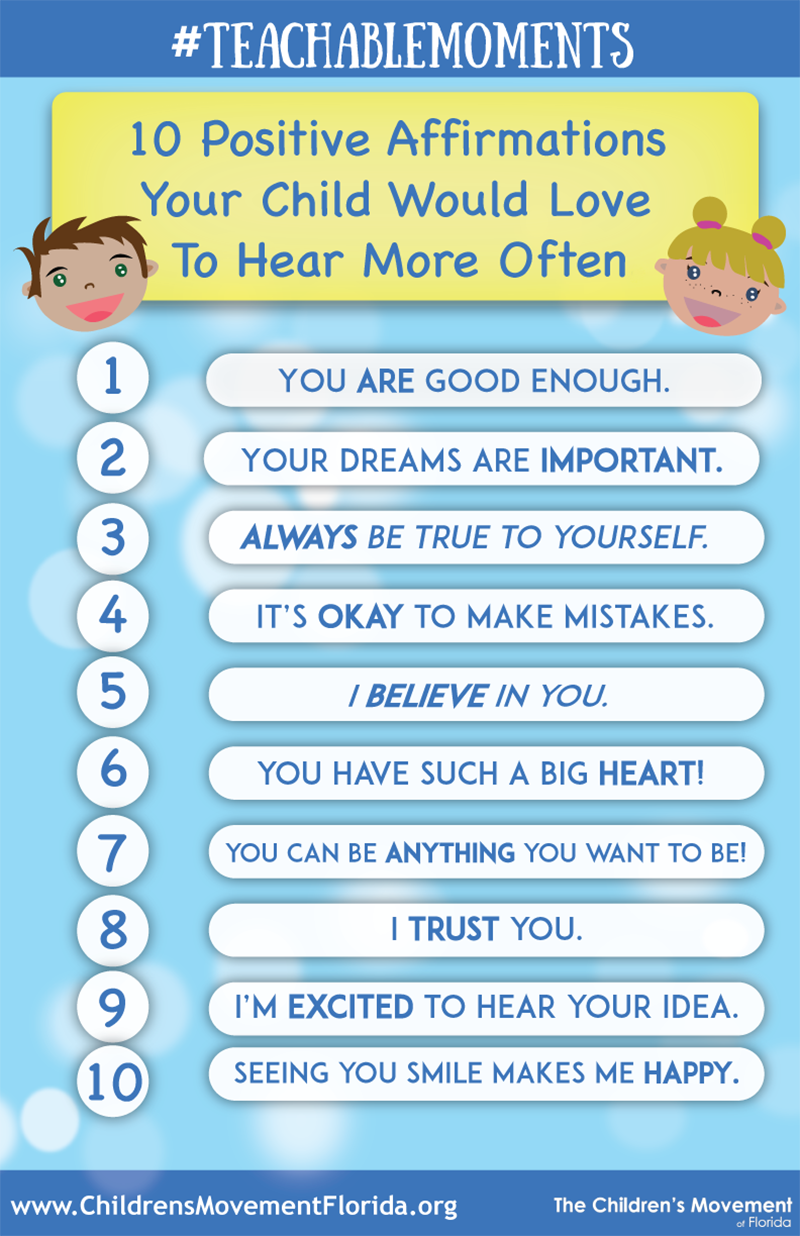
10 Positive Affirmations Your Child Would Love to Hear More Often
- You are good enough.
- Your dreams are important.
- Always be true to yourself.
- It's okay to make mistakes.
- I believe in you.
- You have such a big heart!
- You can be anything you want to be!
- I trust you.
- I'm excited to hear your idea.
- Seeing you smile makes me happy.
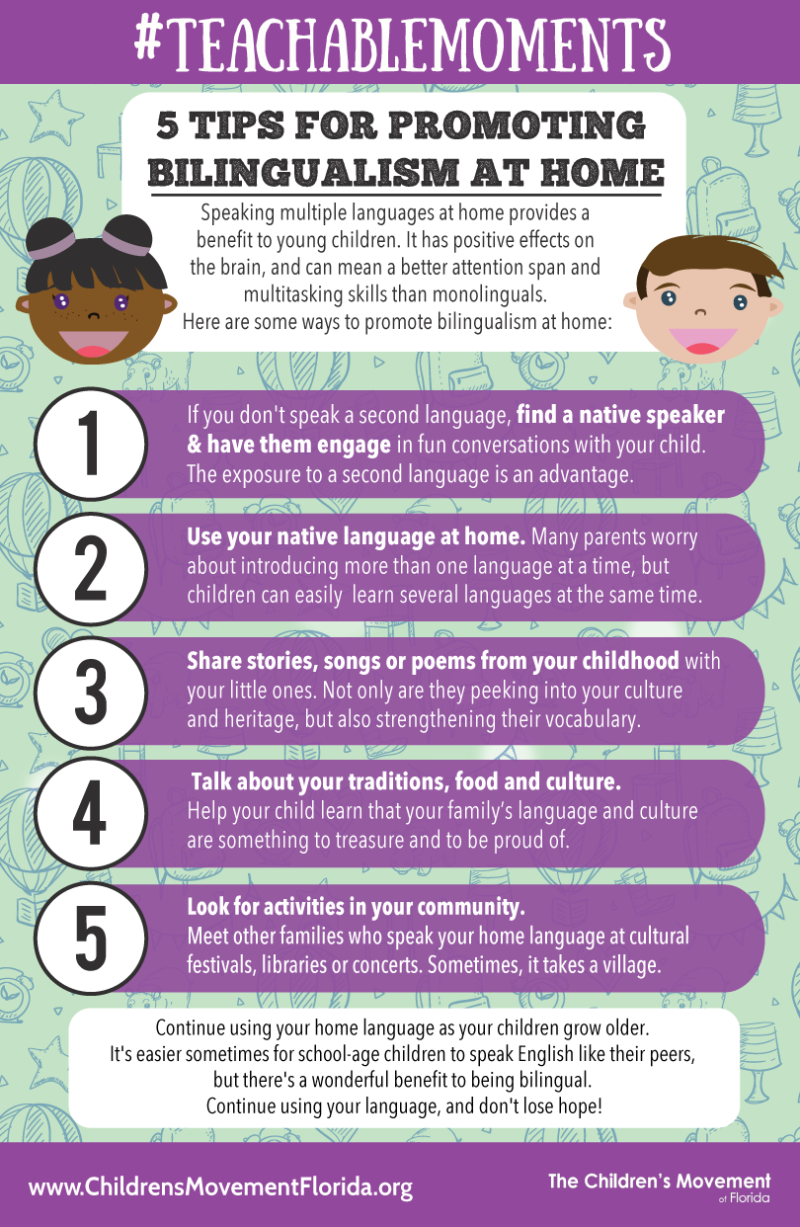
5 Tips for Promoting Bilingualism at Home
Speaking multiple languages at home provides a benefit to young children. It has positive effects on the brain, and can mean a better attention span and multitasking skills than monolinguals. Here are some ways to promote bilingualism at home:
1. If you don't speak a second language, find a native speaker and have them engage in fun conversations with your child. The exposure to a second language is an advantage.
2. Use your native language at home. Many parents worry about introducing more than one language at a time, but children can easily learn several languages at hte same time.
3. Share stories, songs or poems from your childhood with your little ones. Not only are they peeking into your culture and heritage, but also strengthening their vocabulary.
4. Talk about your traditions, food and culture. Help your child learn that your family's language and culture are something to treasure and to b e proud of.
5. Look for activities in your community. Meet other families who speak your home language at cultural festivals, libraries or concerts. Sometimes, it takes a village.
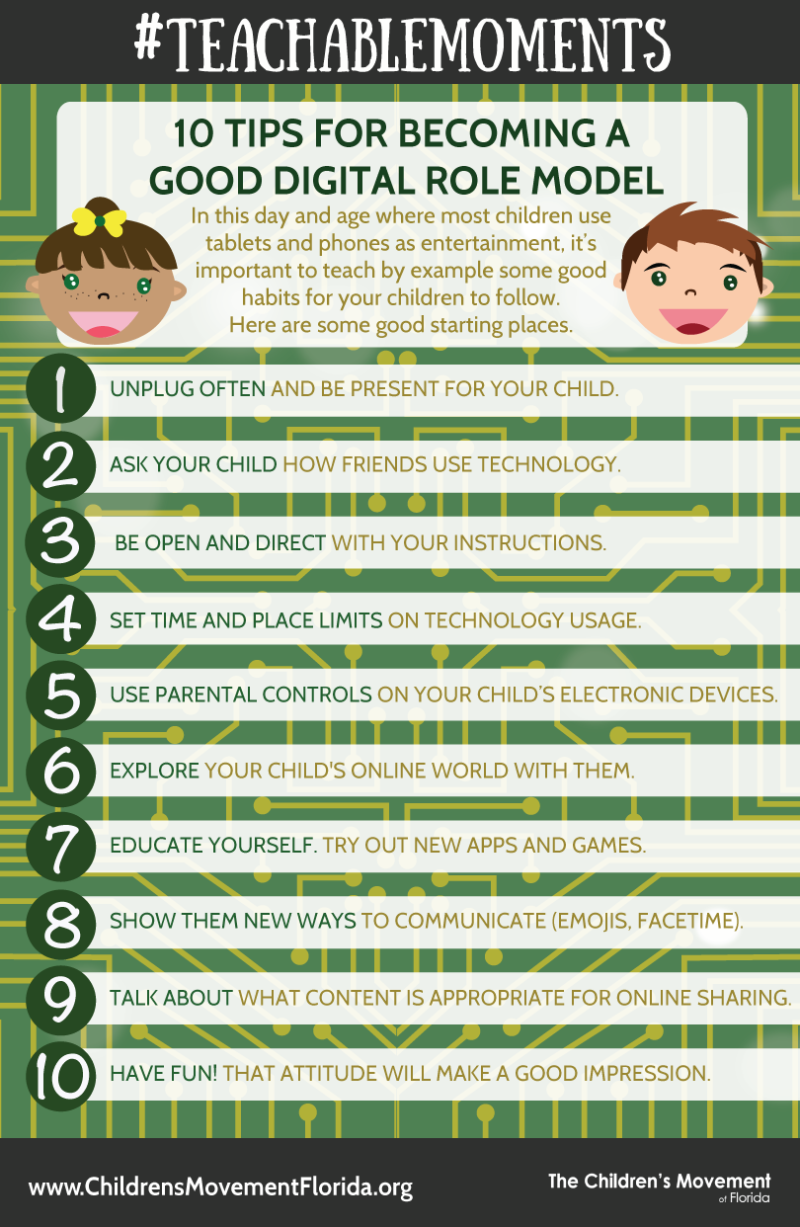
10 Tips for Becoming a Good Digital Role Model
- Unplug often and be present for your child.
- Ask your child how friends use technology.
- Be open and direct with your instructions.
- Set time and place limits on technology usage.
- Use parental controls on your child's electronic devices.
- Explore your child's online world with them.
- Educate yourself. Try out new apps and games.
- Show them new ways to communicate (emoji's, FaceTime).
- Talk about what content is appropriate for online sharing.
- Have fun! That attitude will make a good impression.
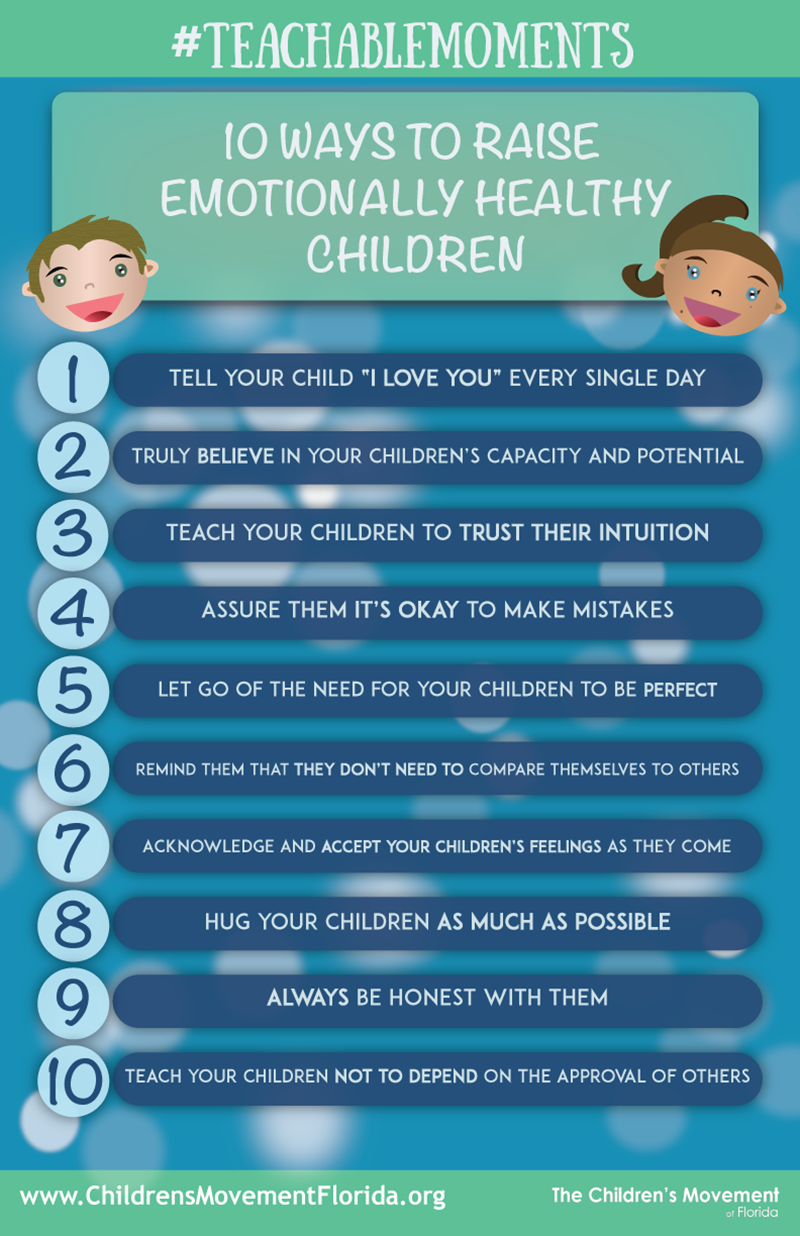
10 Ways to Raise Emotionally Healthy Children
- Tell your child "I love you" every single day.
- Truly believe in your children's capacity and potential.
- Teach your children to trust their intuition.
- Assure them it's okay to make mistakes.
- Let go of the need for your children to be perfect.
- Remind them that they don't need to compare themselves to others.
- Acknowledge and accept your children's feelings as they come.
- Hug your children as much as possible.
- Always be honest with them.
- Teach your children not to depend on the approval of others.
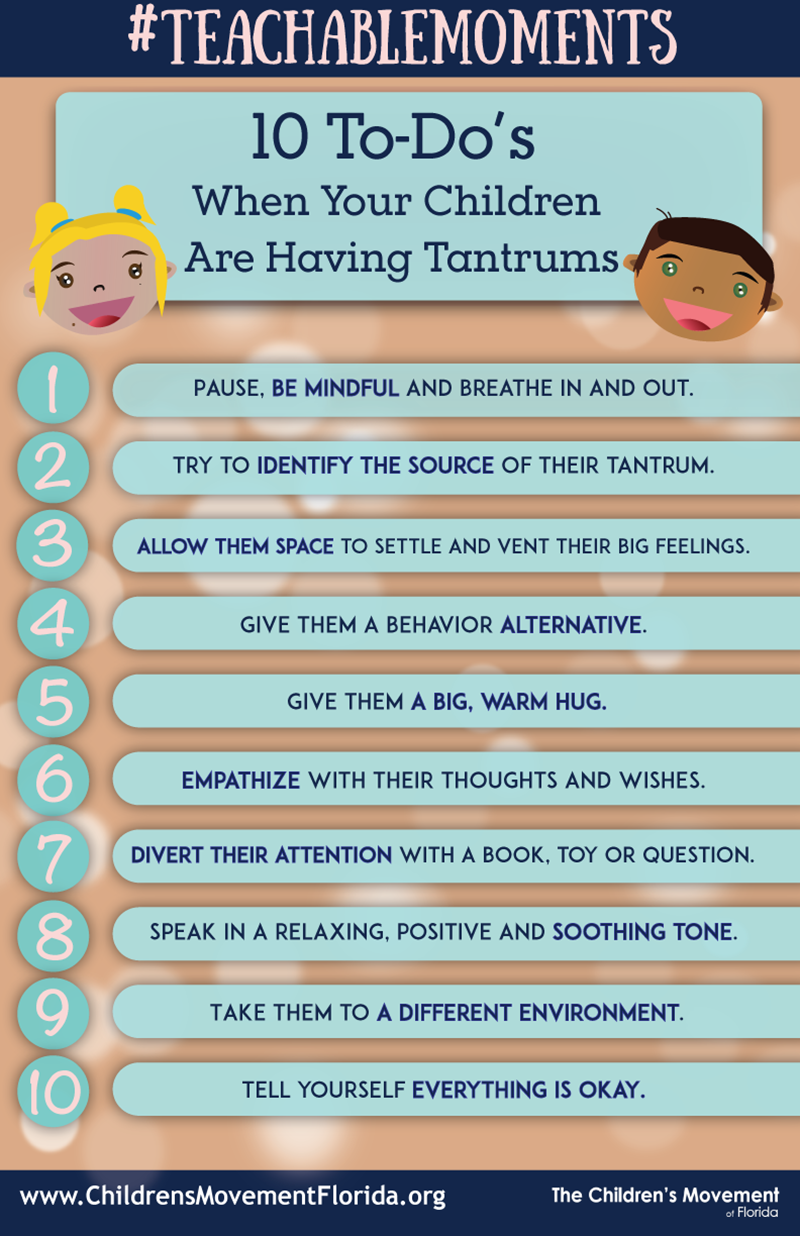
10 To-Dos When Your Children are Having Tantrums
- Pause, be mindful, and breathe in and out.
- Try to identify the source of their tantrum.
- Allow them space to settle and vent their big feelings.
- Give them a behavior alternative.
- Give them a big, warm hug.
- Empathize with their thoughts and wishes.
- Divert their attention with a book, toy or question.
- Speak in a relaxing, positive and soothing tone.
- Take them to a different environment.
- Tell yourself everything is okay.
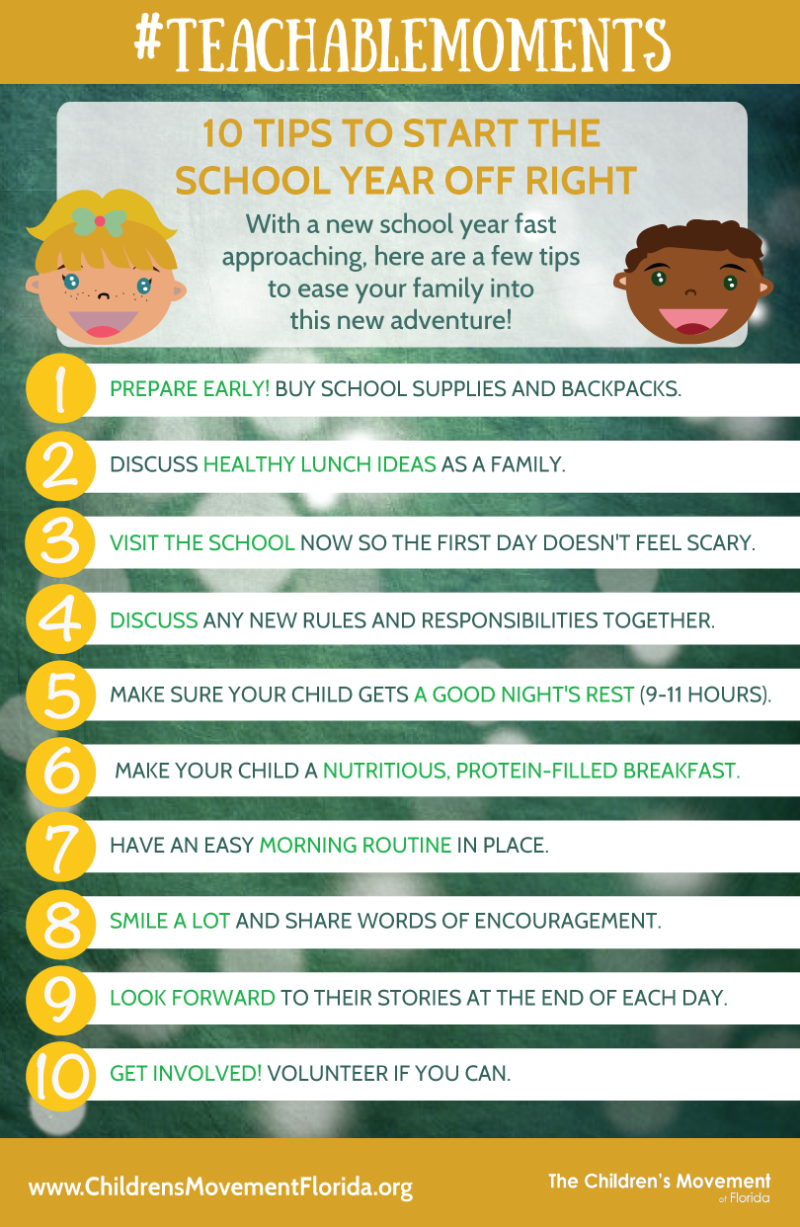
10 Tips to Start the School Year Off Right
- Prepare early! Buy school supplies and backpacks.
- Discuss healthy lunch ideas as a family.
- Visit the school now so the first day doesn't feel scary.
- Discuss any new rules and responsibilities together.
- Make sure your child gets a good night's rest (9-11 hours).
- Make your child a nutritious, protein-filled breakfast.
- Have an easy morning routine in place.
- Smile a lot and share words of encouragement.
- Look forward to their stories at the end of each day.
- Get involved! Volunteer if you can.
